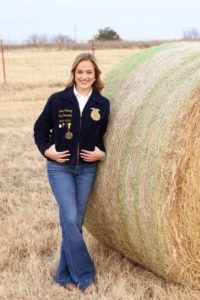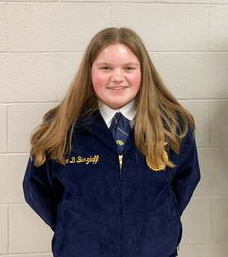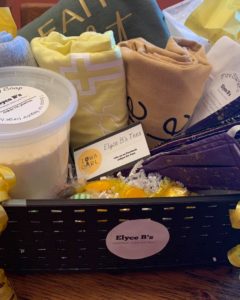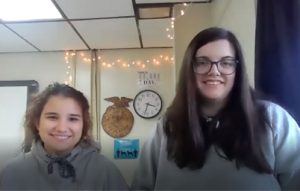Tue, 16 November 2021
I just returned from an incredible three days in Montana, the genesis of which was the greatest professional honor bestowed upon me in my life - presenting my very first keynote address at the college that I received my agriculture degree from to an audience of FFA students. On Thursday I presented a keynote and did my first ever podcast interview in front of a live audience at Montana State University. You all know how much I love my former university and the small city that adopted me for three years. In today's episode I get to tell you all about it!
Direct download: OFI_1230_Tuesday_Episode_-_111521_7.34_PM.mp3
Category:FFA -- posted at: 12:30am MDT |
Mon, 15 November 2021
Our guest today has a really amazing story of growth and development. To preface this, Case Edwards is one of four national proficiency finalists in the category of Ag Mechanics Repair And Maintenance. But to hear him tell his story, when he was a sophomore in high school if you had shown him a spark plug, he would not have known what it was. Case's story really starts with joining the FFA, but it takes a big turn during his sophomore year when his friend Terrence started small engine team in their chapter. He talked Case into being part of it, and soon Case discovered an aptitude that he did not know that he had. This led to the idea of fixing up old lawn mowers and flipping them, and things just kept snowballing
Direct download: Off_Farm_Income-Episode_1229_Case_Edwards-110821.mp3
Category:FFA -- posted at: 12:30am MDT |
Wed, 10 November 2021
Our guest today is very involved in her families dairy and dairy business, but it hasn't always been that way. Along the way to Maggie Mathew's nomination as a National Proficiency Finalist there were some bumps in the road. In some ways her childhood has been very similar to mine, starting with the divorce of her parents. At that point she was exposed to agriculture and livestock, but at a smaller level. However, after her mother remarried she was brought into a farming family and she took flight from there
Direct download: Off_Farm_Income--Episode_1225_Maggie_Mathews-110121.mp3
Category:FFA -- posted at: 12:30am MDT |
Mon, 8 November 2021
The story of today's guest could be a recruiting poster for the FFA, if the FFA actually needed recruiting posters. I found out about Francisco Rocha because he is a national proficiency finalist this year. However, that is the current version of his story. What is so compelling here is the "rest of the story", to quote Paul Harvey. Francisco grew up in Heber, California, which is right next to the larger city of El Centro. When he started high school he was placed in an introduction to science class, and this was taught through the agriculture department. The next thing that Francisco knew, he was an FFA member, and he embraced the group. He continued to get more involved, even though he had not grown up on a farm. In Francisco's junior year of high school, he took a job with his father a produce packing business in El Centro. There, he tagged boxes of produce grown in his area of California as well as produce that had been shipped over from Mexico. After these boxes were tagged they were shipped all over the U.S. to grocery stores and restaurants for human consumption. During this time he was learning about food safety, the supply chain and customer service. At the same time, his FFA advisor encouraged him to make this job his supervised agricultural experience, and he took the advice.
Direct download: Off_Farm_Income--Episode_1223-Francisco_Rocha-110121.mp3
Category:FFA -- posted at: 12:30am MDT |
Wed, 3 November 2021
Our guest today is just a junior in high school, but his achievements suggest someone who is well beyond high school. Ethan Lulich is a National Proficiency Finalist already, for this his supervised agricultural experience restoring and selling antique tractors. In addition to that he has two placement SAE's and another entrepreneurship SAE. He is also serving as his chapter's president already. Needless to say, Ethan is busy, and that means that he has to be well organized. As I conducted this interview with Ethan one theme that kept coming up was goal setting. He is achieving so much in such a short amount of time, there has to be a way that he is getting this done. It turns out that Ethan is very good at setting significant goals and then sketching out a map to follow to help him get there. Between his ability to set these goals and his discipline to follow the plan to achieve them he is seeing great results. Learn more by tuning into this podcast today.
Direct download: Off_Farm_Income--Episode_1219_Ethan_Lulich-102321.mp3
Category:FFA -- posted at: 12:30am MDT |
Tue, 2 November 2021
Last Saturday night at about 11pm my wife and I touched down at the airport, exhausted from an incredible but very active week in Indianapolis. We had been at the National FFA Convention all week, walked dozens of miles and met hundreds of incredible people. We had seen the future leaders of our country, with all of their hope and promise, talent and work ethic, on display for the whole world to see. And then, just like that, it was over. After the plane came to a stop at the gate we walked through the empty airport, retrieved our bags and found our car. Driving through the night we found our way back to our farm, back to our normal life and the last little bit of travel adrenaline wore off. Our daughter had flown to and from the convention with her FFA chapter, so she had beat us home. She was already in bed, and there was no waking her. My wife made her way to bed and to sleep as quickly as possible, but I wasn’t quite ready. I had been gone for five days, and I missed the farm. It was a beautiful night so I decided to take a walk and check a few things before heading to bed. The chickens were all locked up, the pigs had feed and water and the cows and goats were bedded down where they should be. Nothing was amiss, and from the perspective of our livestock it was like we had never left. The night was quiet and clear, and I stood looking at the stars. As I stood there thinking about the great week that we had just concluded I heard a train blow its horn as it approached town. I couldn’t help but smile. Just six hours earlier I had pulled off the side of Interstate 57 to take a picture in front of the Kankakee sign as we drove towards Chicago. We had flown in and out of Chicago and rented a car so we could get a look at the “houses, farms and fields” of Illinois and Indiana on our way to and from the convention. I had purposefully chosen this route on our way back so I could see this town with the funny sounding name that Steve Goodman wrote about and Willie Nelson sang about in the great song, “The City Of New Orleans”. Coordinated Inspiration As I stood there a thought entered my mind and my smile began to grow and grow. At the same time that we had made our way back to our farm, tens of thousands of American youth were making their way back to theirs. All across the country FFA students were making late night arrivals at their family farms, ranches and rural towns as they returned from this great convention. I imagined these students looking up at the stars in their own hometowns, inspired by the time they had just spent in Indiana and dreaming of what their futures would be. There is a big world out there and it is filled with opportunities. However, if you are never exposed to those ideas or nobody ever tells you about them, you don’t even know they exist. For the 55,000+ FFA students who were able to attend this great convention they couldn’t help but be excited. This whole world of opportunity was brought to them and placed at their feet, all under one roof. Whether their path is in the military, the trades, college, niche farming or production agriculture, everywhere they turned there was somebody who was eager to have them join them in their vocation and call to service. I could not fathom how many thousands of students at that moment were telling themselves, “I didn’t know you could do that for a career” or who had received the spark necessary to light the fire in their souls that had just been waiting to burn. If all the adults in the expo hall reaching out to these youth by metaphorically saying “follow me and serve your fellow man” weren’t enough, there were the general sessions. The folks at the FFA are experts at creating an environment that first gets you very excited, followed by inspiration after inspiration in each of these general sessions. No Excuses The best thing this convention does, whether or not this is intentional, is that it removes all excuses. In every session there are FFA students on the stage that are achieving at a very high level. From the National Officers who run the show, to future professional musicians, to American Stars and Proficiency Finalists, you are shown the best of the best. The stories of these students and how they made it to that stage are told to you, and every student sees what is possible. For example, if a student had just found out about a dream career in the expo and told yourself, “that’s for other people, I could never do that”, in the general session they would get a metaphorical wake up call from the stories of the students on the stage that would leave them with only one answer - “If they did it, I can do it too, the only thing holding me back is me”. That is a sobering thought, but it is also freeing and it is just what these students need to hear to be able to unleash their greatness. Student after student walks across that stage. Some receive the highest awards, others do not, but every nominee has achieved things that even adults only dream about. Whether it is the agriscience research finalist whose research began during his freshman year of high school and has now taken him around the world. Or the agribusiness finalist who saw a need at livestock shows that was not being filled and at 19 years of age flies all over the country fulfilling this need for his clients. Or the agricultural placement finalist who had to find a way to fill a major void on his families farm and continue high school when Covid decimated their employee staff. Or a star farmer candidate who started leasing land at an early age and building their own herd to now find themselves in a position to farm for their living. Student after student and story after story erases excuse after excuse and replaces them with inspiration. Neither a student nor an adult can leave a general session without a sense of inspiration and a renewed vigor that makes them believe they can go conquer the world! Every student and every adult takes a lot more home with them from the convention than they brought. I bring home so much energy and inspiration that I almost feel selfish. Organizational Success To go the FFA’s National Convention is to see unbelievable stories of individual success. However, it is also to see an incredible example of organizational success. The 2021 National FFA convention is the 94th iteration of this great event. Since 1928 the National FFA has been chasing a vision of unity, fraternity, education and inclusion in agriculture. The result has been unbelievable growth in the number of chapters and students who choose to be part of this organization. In the midst of the activities, music, lights and competitions of the National FFA Convention one tends to see the individual achievement only. However, if you sit down and watch students walk by, reading the names of the states that they are from on the back of their jackets you see how this kernel of an idea that sprouted almost 100 years ago has transformed agriculture and the lives of millions of American youth since that day. There is no hall of fame for youth organizations or non-profit associations. When one is finally created, the FFA will be a first ballot, charter member. There is room in the FFA for everyone, whether you live in a neighborhood or on a farm. The FFA will teach you the skills you need to succeed and expose you to a career or aptitude that will allow you to thrive. Find your inspiration, find your purpose and find it in the FFA!
Direct download: OFI_1218_Tuesday_Episode_-_11121_6.03_PM.mp3
Category:FFA -- posted at: 12:30am MDT |
Mon, 1 November 2021
So, what's in the water in Slaton, Texas? Is it some sort of magical elixir that produces national proficiency and American Star finalists? This is a question that I am pondering more and more. Today's show features a repeat guest, Rachyl Kitten. Rachyl first appeared on the show just over a year ago on episode #895. The way that I initially found out about Rachyl was that she was a national proficiency finalist in 2020. Well....she is a national proficiency finalist again, this time for 2021! She has great entrepreneurial instincts, a great business, and a great supporting cast at Slaton. What is incredible about Slaton? Tune into this podcast to find out!
Direct download: Rachyl_Kitten_Revised_Episode_-_102921_11.25_AM.mp3
Category:FFA -- posted at: 12:30am MDT |
Wed, 27 October 2021
Lashawna Vogel has so many positive attributes and has accomplished so much already that it is impracticable to try and list them all here. With that said, the thing that stands out to me, so big, is that she grew up outside of agriculture. One of her aunts encouraged her to take ag classes and join the FFA because she knew how positive it could be for Lashawna. Lashawna gave it a shot, and the rest, as they say, is history! Actually, it is not quite history yet. Lashawna is still competing and accomplishing a lot in the FFA. Right now she is serving as a state officer for the State Of Wisconsin. And, she is one of just four national proficiency finalists in the category of Agricultural Communications! She has been working as a "media intern" in the FFA since her 8th-grade year when she was awarded that position in her middle school chapter. She continued that throughout high school and has grown her skill set more and more each year. Now, that exposure, the training, and the challenges are all culminating in national recognition. She is also pursuing a degree in agricultural marketing and communications and plans on advocating for agriculture through the medium in the future.
Direct download: Off_Farm_Income--Episode_1213-Lashawna_Vogel-101821.mp3
Category:FFA -- posted at: 12:30am MDT |
Tue, 26 October 2021
On the day this episode comes out I am heading to my 3rd National FFA Convention, but I won't be going alone. Actually, Hattie is already there with her Conduct Of Chapter Meetings Team as well as 32 other members of her FFA chapter. And, because Hattie is competing there Autumm took the time off of work and is traveling with me to Indianapolis as my assistant. But of course we will both be covering the conduct of meetings competitions very closely and are looking forward to seeing Hattie and all of her teammates perform. Even though this will be my 3rd National Convention, there will be a lot of firsts for me. This is the first time that any of my family members are going. This is the first time that I will be going as a member of the advisory council for Kuna FFA. This will be the first time that Autumm and I have ever visited Chicago. It is going to be a great trip, and I have all of you in the his audience to thank for this! If it were not for you supporting this show, there is a good chance that Hattie would not be in the FFA, I would not be on the advisory council and I would have long since abandoned the podcast and never gone to that very first National Convention! Thank you!
Direct download: OFI_1212_Tuesday_Episode_-_102521_11.52_AM.mp3
Category:FFA -- posted at: 12:30am MDT |
Mon, 25 October 2021
Behind every successful person, there was somebody who was pushing them or encouraging them, and today's interview is absolute proof of that. Kami Holt is a National Proficiency Finalist this year in Ag Sales Entrepreneurship, but her journey didn't just start yesterday. Growing up on her family's century farm in Southern Utah, Kami has been exposed to agriculture her entire life. However, it was her older brother's membership in the FFA that sparked this interest and ultimately led her to join. However, joining was enough for Kami, and when she was asked if she was going to compete for a leadership role she said "no". Kami's grandmother and brother would not take "no" for an answer and really pushed or, as Kami put it, "coerced" her into filling out the application to join the officer team. Ultimately she was selected, spend three years as an officer, and found that to be a very rewarding experience. During this time Kami took over her brother's SAE project, selling corn stalks and straw bales, and continued to grow the business.
Direct download: Off_Farm_Income--Episode_1211-Kami_Holt-101821.mp3
Category:FFA -- posted at: 12:30am MDT |
Thu, 21 October 2021
is interview is so good, it is worth another play. Hannah was originally on our show on episode #410 talking all about how she combines an eye for art with her knowledge of agriculture. I am proud to say that her talents took her all the way to becoming an American Star Finalist in 2020, and it was my pleasure to profile her again. Below are the show notes from the first time she was on the show. Original Show Notes: Have you ever heard of a starving artist? Of course, you have. How about that old cliche about the artist that created a solid business plan, developed a targeted market that would pay for their art, and designed a solid business? Right.....that cliche is not as common. Our guest today is that second kind of artist. Hannah York has an eye for art. Specifically, she crafts her vision into artistic holiday creations for businesses around Princeton, Kentucky. She has one, VERY busy season where she must completely prioritize her business. As her reputation grows, so does the demand for this service that she provides.
Direct download: Off_Farm_Income--Episode_1208-Recap_Of_Episode_925-100521.mp3
Category:FFA -- posted at: 12:30am MDT |
Wed, 20 October 2021
Kayla Rossi is a National Proficiency Finalist in the category of diversified livestock production this year. And to look at what she is currently doing and what she has already accomplished might make you think that it has been easy. If that is the case, it is only because she makes it look that way. Kayla raises her livestock on her family's ranch in the high country of Northwest Colorado. This brings challenges that many of the rest of us never have to deal with including harsh winters, drought, and predators. In 2019, as Kayla was really getting ready to hit her stride in her herd of cattle, a herd of goats, and a flock of sheep she had a major predator loss. That year her profit, or lack thereof, on her lambs was negative $29. She did not allow this to stop or discourage her, however. She made adjustments and persisted.
Direct download: Off_Farm_Income--Episode_1207-Kayla_Rossi-101421_1.mp3
Category:FFA -- posted at: 12:30am MDT |
Mon, 18 October 2021
As you all know this show is all about entrepreneurship in agriculture. So, I almost never interview FFA students with placement SAE's except for American Star Finalists. Guests like Duncan Patton definitely make me rethink this strategy. It seems like I run into this same puzzle each time it is American Star Interview Season. I come across a student who has risen to the top in agricultural placement, and I can see the extreme wisdom in what they have done. Duncan Patton definitely has this wisdom. Duncan has been working on his family's farm since he was five years old, and that is right where he wants to be. However, he has also worked for a number of neighboring ranches and farms, learning a myriad of other skills. After high school, Duncan moved all the way to Ohio to study diesel technology, and while he was there he worked for a very large farming operation and learned about chickens and the different ways that farming gets done there. During the interview, Duncan talked about these experiences.
Direct download: Off_Farm_Income--Episode_1205_Duncan_Patton-101321.mp3
Category:FFA -- posted at: 12:30am MDT |
Thu, 14 October 2021
Not much has changed when it comes to using the term "value-added" since the first time I aired this interview with Logan Schlauch who is benefitting from the trend in adding something a little extra or giving the consumer a little more while, in this case, a dairy producer can add to his bottom line. Here is the story of one small dairy operation that got creative and created a value-added product in order not only to help with profit margins but to also appease customer demand for greek style yogurts. Additionally, this project has served as an FFA learning experience for Logan Schlauch.
Direct download: Off_Farm_Income--Episode_1202-Recap_Of_Episode_821-100521.mp3
Category:FFA -- posted at: 12:30am MDT |
Wed, 13 October 2021
Interviewing FFA students I find myself constantly asking "what was I doing during high school?". I think I was a pretty typical high school student way back in the 1900s. I played sports, got decent grades, had a job, and focused on menial things outside of that. I also wasn't in the FFA, and interviewing these students from all over the country makes me realize that there is a whole other level of achievement possible in high school. To say that there is a whole other level of achievement seems like an understatement when describing today's guest. Josh Heupel is an American Star Farmer Finalist, and his resume is unbelievable. As a junior in college, majoring in agricultural business and political science, Josh has already accomplished a lifetime of achievements. He is leasing and farming 97 acres of walnuts and 84 acres of almonds. He has designed and patented a piece of equipment to improve nut farmers' harvests and encourage the use of cover crops in orchards. He owns and operates his own custom spreading business. And, he is soon to graduate from college and take up a role advocating for agriculture in the Central Valley of California that I think is going to be unprecedented in its effectiveness.
Direct download: Off_Farm_Income--Episode_1201_Josh_Heupel-100721.mp3
Category:FFA -- posted at: 12:30am MDT |
Mon, 11 October 2021
Our guest today is an American Star Finalist in the category of Agricultural Placement, and there is an incredible story that comes along with this nomination. Caleb Peckham has grown up on his family's small dairy farm in eastern Connecticut. In the latter half of the 2010s, low milk prices were harming dairies all over the United States, but smaller dairies in Connecticut seemed to be getting hit extra hard because they were so much more sensitive to the margins they were operating on. As a response to these prices, Caleb's parents knew that something had to be done so that their family farm could survive. The decision to start direct marketing products through a farm store they called Farm To Table Market in 2018.
Direct download: Off_Farm_Income--Episode_1199_Caleb_Peckham-100121.mp3
Category:FFA -- posted at: 12:30am MDT |
Wed, 6 October 2021
One of the things that I love about interviewing FFA students is coming across individuals that don't care what age they are and who will not take "no" for an answer. Never has that been more true than in my interview with Mackenzie Camacho today. Mackenzie is now a sophomore at Purdue University, where she is studying civil engineering. She has been nominated an American Star Finalist in the category of agriscience research, and it has not been easy. Mackenzie grew up in the San Joaquin Valley of California around many different tree crops, and something about them and research took hold when she joined the FFA. Mackenzie started studying different parasitic pathogens in tree crops and how they could be controlled either through specific management practices or by altering traditional management practices. However, she was doing really advanced work while still in high school. As a result, some of the researchers she took her findings to dismissed her without really hearing her out. However, she didn't give up and continued talking to researchers about what she had found and what her conclusions were until she found somebody who would listen. As a result, she has now presented to farmers all across the West, and she found partners to help her further her research. Mackenzie now wants to focus on building infrastructure, like dams, that can help California agriculture. I am very excited to see where she takes all of this!
Direct download: Off_Farm_Income--Episode_1195_Mackenzie_Camacho-100121.mp3
Category:FFA -- posted at: 12:30pm MDT |
Mon, 4 October 2021
I don't even know where to begin in describing today's guest or her accomplishments. Emily Acevedo is a bundle of energy, confidence, and personality. And with her combining a love for research with such incredible people skills, she is really going to climb to heights that maybe even she is not imagining right now. At the age of 20, Emily is a hardened veteran in the world of agriscience research. After all, she reluctantly joined the FFA in the 6th Grade and found herself on stage later that year as a state proficiency finalist! And after an unexpected kidding incident at the fairgrounds, with no parents around when she was young, she has been obsessed with reproduction in goats ever since. That has driven her research, and that is what will take her to Indianapolis later this month to go on the big stage as an American Star Finalist in Agriscience Research.
Direct download: Off_Farm_Income--Episode_1193_Emily_Acevedo-092821.mp3
Category:FFA -- posted at: 12:30am MDT |
Thu, 30 September 2021
On Today's show, I replay a fun and entertaining interview on how two FFA members teamed up to craft a unique FFA SAE. It is not just about the finished art products, it is also about unique marketing and forming a partnership using specific skillsets with a common interest in woodwork and art. More about how this idea for a "board art" SAE came about coming up in today's show. (Replay of Episode #316)
Direct download: Off_Farm_Income--Episode_1190_Recap_Of_Episode_316-091121.mp3
Category:FFA -- posted at: 12:30am MDT |
Wed, 29 September 2021
On multiple occasions, after interviewing FFA students who have started lawn care businesses, I have referred to this particular type of business as a "future millionaire maker". It seems as though every single year there is an FFA student who is a finalist for the American Star in Agribusiness that is the owner of a lawn care company, and that is because this is such a strong and great business to have. In today's episode, I get to interview Matt Rowlette, the owner, and creator of Rowlettes Lawn Care. This company actually officially began when Matt was eight years old, and he was hired to trim weeds along his uncle's fence, bordering 150 acres. His parents purchased his first mower and trimmer for him, and he has those still today. However, he has been steadily reinvesting into his business and growing it since that time.
Direct download: Off_Farm_Income--Episode_1189_Matt_Rowlette-090721.mp3
Category:FFA -- posted at: 12:30am MDT |
Mon, 27 September 2021
Today's guest, Chase Krug, first appeared on the Off-Farm Income Podcast in episode #203 when he was a freshman in high school in 2016. Back then he was already doing research and had been awarded an SAE Grant to study the Colorado Potato Beetle as well as blight in potatoes. Over the past five years he has continued his passion for both research and plant breeding, and has added 13 more research projects for a total of 15 (he had one before the potatoes). If you are wondering, this is not the norm, this is exceptional. So exceptional in fact that right after Chase graduated from high school he was sent to India, by himself, to work on plant breeding and research new varieties of mung beans through an internship he had been granted. Chase has continued to be recognized and be awarded internships and jobs such as working for the the USDA - ERS and publishing recommendations for countries like Egypt. And now, he has been nominated as an American Star Finalist in the category of Agriscience Research.
Direct download: Off_Farm_Income--Episode_1187-Chase_Krug-090621_1.mp3
Category:FFA -- posted at: 12:30am MDT |
Mon, 20 September 2021
I interview a lot of high school students on this show with great businesses. Even with these fantastic businesses already started, many of them tell me that they do not plan on continuing as a business owner or they are going to go to college after high school and possibly continue the business on the side in the future. For some reason, even though they have seen success as business owners during their time in the FFA they don't see it as a possibility as a future career. Our guest today, Tyler Ertzberger, is not one of those students. And, what has it led to? He is an American Star Finalist in Agribusiness.
Direct download: Off_Farm_Income--Episode_1181_Tyler_Ertizberger-090221.mp3
Category:FFA -- posted at: 12:30am MDT |
Wed, 15 September 2021
There is something very special about being able to interview all of the American Star Award Finalists every year. It is definitely a time of year that is inspirational to me and that gives me the motivation to continue my quest into entrepreneurship. And the only thing that can make that even more special is when one of those finalists has been a guest on the show before. After 7 years of interviewing FFA students, and increasing the number of FFA students that I interview from 52 to 104 per year, that has been happening more frequently, and that is happening today! Raegan Klaassen is an American Star Farmer Finalist, and she first appeared on the Off-Farm Income Podcast in February of 2017 on episode #251 when she was just a freshman. I don't think I had enough experience to predict that she would have this level of success way back then, but looking back on what I wrote in the show notes for her episode I should have seen it coming.
Direct download: Off_Farm_Income--Episode_1177_Raegan_Klaassen.mp3
Category:FFA -- posted at: 12:30am MDT |
Mon, 13 September 2021
I try to interview every American Star Finalist, every year at this time. To me, getting to spend 20-30 minutes asking these FFA members about their journeys is what it would be like for other people to get to interview a star athlete for that amount of time. These students have risen to the top of an organization with a lot of talent. When these students are finally named as an American Star Finalist they have overcome the odds and been selected as one of four students in their category out of a total population of students of over 700,000. That puts them in the top .0005% of all FFA students. Those are more difficult odds than making it to the major leagues, NBA, or the NFL! Today's episode is another example of the talent level that the FFA holds. Our guest, Wyatt Harlan, knew at an early age that other extracurricular activities like sports or drama were not going to be for him. So, he chose the FFA based on his agricultural roots and lifestyle, and he poured himself into it. Six years after joining he had found himself as a Texas State FFA Vice-President, a business owner, and now an American Star Finalist in Agribusiness
Direct download: Wyatt_Harlan_Episode_1175_Commercials_Removed_-_101822_7.44_AM.mp3
Category:FFA -- posted at: 12:30am MDT |
Wed, 8 September 2021
On today's show, we are featuring an American Star Finalist in agricultural placement. These are always great interviews because the students that make it to this level are so dedicated to whomever they are working for, family or otherwise, their talents and work ethic shine through. That is definitely true with Jakob Weinheimer. Jakob has grown up in Claude, Texas working on his family's farm. In their portion of Texas, they are growing cotton, corn, wheat, and milo. Some of this is done on the irrigated ground and some on dry ground. Each poses its own challenges. Jakob is a pivotal part of this operation, and he has progressively been given more and more responsibility every growing season as he has got older. Being recognized as an American Star Finalist is not the first recognition that Jakob has received. In 2019 he was a national proficiency winner in grain production, so he has been to the big stage once already. Interestingly he did this with a different chapter at Claude High School. However, since graduation from high, he switched chapters to continue pursuing achievements in the FFA. Jakob's sister is in the FFA through the Pan Handle Chapter, so he switched over to that chapter to make keeping up his record book seamless.
Direct download: Off_Farm_Income--Episode_1171_Jakob_Weinheimer-082421.mp3
Category:FFA -- posted at: 12:30am MDT |
Mon, 6 September 2021
Every year I am so fortunate to interview the sixteen students who are finalists for American Star Awards. This year we are kicking it off with Grady Johnson. Grady previously appeared on the Off-Farm Income Podcast in episode #482 back in 2018. It is always a significant thrill for me when a student who I have previously profiled comes back onto the show because they are accomplishing so much, like Grady is.
Direct download: Off_Farm_Income--Episode_1169_Grady_Johnson-081021.mp3
Category:FFA -- posted at: 12:30am MDT |
Wed, 1 September 2021
After 1,100+ interviews and 800+ interviews with FFA students you would think that I have seen it all, or at least most of it. So, when I am surprised I am thrilled. That is exactly what happened to me in today's interview with Annie Boomsma. Annie is just entering her senior year of high school as her chapter's president. She, her brother and her father run their families 3rd generation cattle ranch in Wessington, South Dakota where they raise commercial cattle. Annie has her own project though, and it is impressive. Annie currently owns 18 dairy cows that she purchased as either culls or springers. She purchased all of them for their milk production and so that they could be "nurse cows". Annie also owns 75 calves that she purchased to be raised by these nurse cows. Every morning before school and every evening after, she heads out to the barn, brings the cows in, puts between 4 and 7 calves on them to nurse, and then turns them all back out. Annie has found a niche in the market with calves that are sold early and dairy cattle that are culled because they don't produce enough for the dairy but still produce plenty to raise several calves. This is a brilliant method of making money with cattle, and I have never profiled it even once in seven years of conducting interviews with farmers and FFA students.
Direct download: Off_Farm_Income--Episode_1165_Annie_Boomsma-082421.mp3
Category:FFA -- posted at: 12:30am MDT |
Mon, 30 August 2021
Today's interview is packed with interesting facts about our guest and tips from her. There is almost too much to fit in to a just a couple of paragraphs of show notes, but as a professional podcaster I will get it done! Way back in the 5th Grade, Kaylee Bosma discovered an interest in chickens and approached her parents with a request to obtain some to show through the 4H. Although hesitant, 30 chickens were purchased, and a new project was begun. Kaylee's parents had no way to know where it was going to be taking their aspirational daughter.
Direct download: Off_Farm_Income--Episode_1163_Kaylee_Bosma-082321.mp3
Category:FFA -- posted at: 12:30am MDT |
Wed, 25 August 2021
Today I have the pleasure of interviewing a fantastic achiever in the FFA, Baylee Brown, the president of the Mulhall-Orlando FFA Chapter at Mulhall-Orlando High School in Orlando, Oklahoma. Baylee has her hands in a lot of projects. So many in fact that it was difficult to talk about all of them in the interview. She is just starting her second term as her chapter's president, she won a state proficiency for her pig business last year, just was awarded gold status for her national proficiency application and is also doing an agriscience research project.
Direct download: Off_Farm_Income--Episode_1159_Baylee_Brown-081921.mp3
Category:FFA -- posted at: 12:30am MDT |
Mon, 23 August 2021
The title of today's episode is probably the most serious title of an episode that I have ever written, but it is true. Our guest, Austin Archer, started off the interview by declaring that he doesn't like school. When I asked him why he joined the FFA, that was his answer. Even as an incoming freshman he knew that if he did not have classes that allowed him to learn by doing, rather than reading, that he would fail. So, he joined the FFA and never looked back.
Direct download: Off_Farm_Income--Episode_1157_Austin_Archer-081721.mp3
Category:FFA -- posted at: 12:30am MDT |
Mon, 16 August 2021
What is it in people that makes them look at something and say "I'd like to try that?" I don't know the answer to that question, but I do know that I don't have it! Our guest today, Toby Barringer, does. At a farm sale Toby and his father saw an old coal fired, blacksmithing furnace and decided to try it out. Today, Toby has a blacksmithing business called Brother Bear Blacksmithing Shop, and he is selling products all over the United States as well as doing custom work for customers. This all started with a natural curiosity, which Toby encourages you all to follow.
Direct download: Off_Farm_Income--Episode_1151_Toby_Berringer-072621.mp3
Category:FFA -- posted at: 4:30pm MDT |
Wed, 11 August 2021
Today's guest is Hannah Auer from Weld Central High School in Colorado. There was a lot to talk about with Hannah in her interview, but one theme kept repeating itself, and that was how Hannah is looking forward, setting goals for herself and planning her future. They say that you cannot get anywhere if you don't know where you are going, and that is not a problem for Hannah. Even having just finished her freshman year of high school, she has a firm grasp on creating a road map to her future.
Direct download: Off_Farm_Income--Episode_1147-Hannah_Auar-072621_1.mp3
Category:FFA -- posted at: 12:30am MDT |
Mon, 9 August 2021
Abby Mitchell first appeared on the Off-Farm Income Podcast in March of this year. At that point in time she was just in the brainstorming phase of the business she was developing for her supervised agricultural experience - "Goat To Be Kidding". Today she is back on the show with an update! She put herself out there again, and has been recognized again. And, her business is progressing forward quickly. I'm excited to have her back on the show.
Direct download: Off_Farm_Income--Episode_1145_Abigail_Mitchell-072221.mp3
Category:FFA -- posted at: 12:30am MDT |
Wed, 4 August 2021
Our guest today just graduated high school, and she has accomplished a lot. She lives and works on her families cattle ranch in Montana which gives her a lot of responsibilities. She is already certified to artificially inseminate cattle, and she helps her parents get their females bred every year. She also runs a "heifer improvement program" for the family which takes up a lot of her time. In addition to all of this, she has been involved in the FFA for four years, serving as historian, secretary and finally, chapter president. What is amazing about Reace Lannen's story is that right in the middle of her journey through the FFA she developed an unknown problem that kept her from walking, let alone working on the ranch and participating in the FFA. After a trip to the Seattle Children's Hospital she found out what the problem was - juvenile arthritis. After a diagnosis was reached, a treatment was prescribed - a shot of chemo therapy to be given to her once she got back to Montana. However, the shot caused her to have a severe, anaphylactic allergic reaction, so that was no longer an option. Then, through the FFA, she met an advisor at an FFA event, whose wife had rheumatoid arthritis. Information was shared, and Reace found a medication that continues to work very well for her to this day. Once Reace did not have to focus so much on treating her arthritis so much, and she returned to what life was like prior to her first inflammation, she started reflecting on what she had gone through. One of the worst parts of the ordeal was the six months in which she could not live her normal life. She was unable to help out on the ranch or be around the livestock that she loves so much. This reflection inspired an idea. So today, Reace has purchased to miniature horses and a small, Corriente calf that she is training to be therapy animals. Reace is actually in the process of becoming certified to do this right now. She now has a mission of helping people who feel disconnected from the farm life and livestock that they love because of a medical connection, to be able to be around livestock again. She knows just what it is like to smell a horse or a cow after you haven't been able to for a long time. For somebody who loves livestock she believes there is healing in that, and she wants to help other people heal.
Direct download: Off_Farm_Income--Episode_1141_Reace_Lannen-071521.mp3
Category:FFA -- posted at: 12:30am MDT |
Mon, 2 August 2021
Kirsten Wood grew up on her families cattle ranch in Weldona, Colorado. As she described the ranch to me, she talked about a lot of different niches that her family has explored to diversify their operation and keep it sustainable for a future in ranching. These new ways of doing business include selling boxed beef to folks living in the urban areas along the Rocky Mountain front from Denver up through Boulder and beyond in Central Colorado. It also includes partnering with some other companies to sell spices, sea salt and other products that compliment the beef that they sell. The operation involves raising cattle on pasture, finishing cattle in a feed lot and growing the crops needed to feed those cattle. And, in the scope of the operation some calves become orphans for one reason or another. Either their dam dies or possibly rejects the calf, and the calf then needs special care to survive. This is where Kirsten found her niche, within her families niche ranch. Kirsten started purchasing these orphan calves from her families ranch and bottle feeding them. She would raise them on a bottle and introduce them to feed as they grew. Then, when they were ready to be weaned she would transition them to the feedlot, and pay her family for the space and feed that was required to keep them. Ultimately they were finished and sold, and this was Kirsten's business. In addition to this Kirsten has a love of horses that was developed by growing up around them on the working ranch. Throughout her FFA career she has been raising and showing horses, and this led her to a proficiency award in equine science. All of this has inspired her to pursue a future in agricultural business. When we conducted this interview she had just graduated with an associates degree in Ag Business, and she was just preparing to start her final two years of college at West Texas A&M in Canyon, Texas. Kirsten hopes to come home to the ranch one day, but she has been told to go out and make it on her own first. Right now she is looking into an agriculture finance career with the hopes of coming back to the lifestyle that she loves in the future.
Direct download: Off_Farm_Income--Episode_1139_Kristen_Wood-071521.mp3
Category:FFA -- posted at: 12:30am MDT |
Wed, 28 July 2021
The other day an article about a young man with a trapping business popped up on my computer. I took a look at it and thought, "this would be a good interview for the show". Sam Terneus had just been awarded the Illinois State Proficiency Award for Agricultural Processing based on what he had been doing with trapping fur bearers and selling their hides as a business. I thought that was going to be the whole story, but it was just the tip of the iceberg! Sam has been trapping for years now, since he got exposed to the hobby/sport/business at an early age. He has actually been living kind of a dream life really. He and his parents live in town, and his grandfather has a farm out of town. To get to the farm to help out grandpa and to go trap, Sam has been traveling through the backwoods of Illinois on his four wheeler for several years. As Sam stated, "the farm is five minutes by car and twenty minutes by four wheeler". Sam prefers the road less traveled. Sam is constantly selling furs, and he is constantly reinvesting his money into more traps and expanding. This is what led to him starting his own business called "Wilderness Design Company". Among other things, Sam has created and sold Christmas wreathes made out of the furs that he has trapped. Sam is very involved in working for himself. He has been taking a course on entrepreneurship, and through that he has done some amazing things. He came up with a business idea to become a nuisance wildlife trapper, which I wholeheartedly support, and began exploring that possibility. It turns out that you need a special license to do that in Illinois, and you must be at least 18 years of age to obtain one. Well, Sam is still 17, so he started trying to figure out what he could do to get around this law. Ultimately, there was nothing that could be done. However, thanks to Sam's efforts, there is now a bill before the Illinois State Legislature to lower the age of a person who wants to get this license! If all of this were not a enough, Sam just received his state FFA degree, and he is getting ready to start college. He plans to study forestry with an emphasis on fish and wildlife to increase his knowledge in the business that he has already started and loves. In addition to that, he is planning to compete at the national level with his supervised agriculture experience and hopes to be a national proficiency winner very soon!
Direct download: Off_Farm_Income--Episode_1135_Sam_Terneus-071121.mp3
Category:FFA -- posted at: 12:30am MDT |
Mon, 26 July 2021
I really enjoy interviewing FFA students because I get to witness the transition they go through as they move to bigger projects. In today's interview that statement is both literal and figurative. Emily Spayd has just begun her FFA journey. She is getting ready to begin her sophomore year of high school and her second year in the FFA. She has been showing goats at her county's fair for several years, but just like she went big in the FFA, she decided to go big in the show ring. So, Emily has now transitioned from goats to beef cattle for her fair projects. This wasn't only a size increase in animal, but it was also a size increase in responsibility. Emily began halter breaking her steer and heifer in the middle of January....in Colorado. Needless to say, this is cold and frustrating work, but it is necessary to show this large of an animal. This seems to be Emily's style however. In the interview she talks about being dragged to FFA events with her sister who is three years older than her, and being bored. However, after deciding to give the FFA a try, Emily dove in 110%. She participated in every competition that she could, and she has already been selected to be an officer. She will begin serving as parliamentarian when school starts again this fall. As this episode is published, Emily will be engrossed in one of the two county fairs in which she will be showing her beef projects this summer. In her county you are only allowed to sell your project at the auction if you reach certain level of success while showing. So, we've got our fingers crossed for Emily that she will be able to auction off both her steer and heifer this summer!
Direct download: Off_Farm_Income--Episode_1133_Emily_Spayd-071121.mp3
Category:FFA -- posted at: 12:30am MDT |
Wed, 21 July 2021
Our guest today is just getting ready to begin her senior year of high school, and she has discovered a profession that I did not know existed as her future career. Jaycey Lambert serves on the executive committee of the Weld Central High School FFA Chapter. She has been showing sheep for years, and now she has added showing steers into the mix. Earlier this year Jaycey had a lamb that was not acting correctly, and in trying to diagnose what was wrong with it she turned to a person with the profession of "livestock chiropractor". The livestock chiropractor came to her farm, looked over the lamb with special equipment and determined that its back was out. Once he was diagnosed, she was able to move its back into proper position, and voila! he was good as new. This inspired Jaycey, and she has her sights set on this career in the future. Jaycey is planning on attending South Dakota State University to study agriculture. She has visited the campus already and found the class sizes and campus size to be just right for her. I'll be excited to have Jaycey back on the show in a few years to profile her ag business of livestock
Direct download: Off_Farm_Income--Episode_1129_Jaycey_Lambert-070521_1.mp3
Category:FFA -- posted at: 12:30am MDT |
Mon, 19 July 2021
Almost two years ago exactly I featured today's guest on episode #665 of the Off-Farm Income Podcast. When I first interviewed Annamarie Stone she was just getting ready to start her sophomore year of high school, and she was raising meat chickens. She had just approached to grocery stores and obtained contracts to sell her birds in both stores. Since that time Annamarie has flourished in her FFA career. Today she is on the executive officer team in her chapter, and she is the Area IV President in the State Of Missouri. Her business has also flourished and grown. Now she is also selling turkeys, bacon, mums and poinsettias. So, she had to change the business name to "Stoney Creek Meats & More". While this caused a lot of work it was necessary and definitely worth it! On today's episode we will catch up with Annamarie and update you on the incredible progress of this student. Here are the show notes from her previous visit to the show: INTRODUCING ANNAMARIE STONE! Have you ever met somebody with no fear and a can-do attitude? If not, you get to, today. Annamarie Stone is just that type of person, and she is just getting ready to start her sophomore year of high school. Why do I say this about this young lady? In addition to starting her own herd of Charolais cattle, showing pigs and showing sheep she has another enterprise. Annamarie started her own business called "Stoney Creek Country Fresh Chickens". She raises pastured poultry and sells birds to customers who want their chicken raised that way. Annamarie decided that she wanted to sell her chicken in grocery stores as well. So, as a freshman in high school she got dressed nicely, walked into two separate grocery stores and requested to speak with the freezer case manager. By the time Annamarie was done, she was selling her pastured poultry in two separate grocery stores! When I asked Annamarie how she did this she had a very simple explanation. The worst that they could tell you is "no", and if they don't like your idea the grocery store down the street probably will. This is an enterprising entrepreneur in the making!
Direct download: Off_Farm_Income--Episode_1127_Annamrie_Stone-070521.mp3
Category:FFA -- posted at: 12:30am MDT |
Wed, 14 July 2021
I've been talking about entrepreneurship and the transition from being an employee to a full-time entrepreneur on this show for almost seven years now. From personal experience, I knew that the process I was explaining was correct. However, nothing really brings it home like somebody else talking about experiencing the exact thing I have been explaining. That is exactly what happens in today's interview with Dawson Boys. Dawson just won a proficiency award in the State Of Illinois for agricultural mechanics & repair entrepreneurship because of the car detailing business that he began while in the FFA. He is now a full-time entrepreneur with no job other than his business. However, it did not start out that way. Dawson's business got started because his first customer noticed how clean and polished he kept his own car, told him that he should detail cars for a living and then hired him to details theirs! After that seed of an idea was planted, Dawson took off with it. Today, the word of mouth has spread and he has lots of business. Dawson understands the competition in his area, and he understands what his competitive advantages are. Therefore, he is knocking it out of the park with his business. As Dawson tells the story of growing his business, he talks about the fact that he was working two jobs when he started this. And, as his business grew he entered what I refer to as the "crazy time" in which he was not ready to leave either of his jobs but the demands of his new business became larger and larger. Eventually, Dawson left his first job, then his second and he found himself as a full-time entrepreneur. He had to go through the "crazy time" first, and then things gradually mellowed out. Dawson also had to convince his parents that his business would really work and that leaving his steady jobs would not be a mistake. He did it just as I prescribe. He worked a ton of hours to demonstrate his commitment, and he made good money to demonstrate the viability of the business. Once he did that, there was no need for words to convince his parents. He had proved the concept, and they gave him their blessing.
Direct download: Off_Farm_Income--Episode_1123_Dawson_Boys-062821.mp3
Category:FFA -- posted at: 12:30am MDT |
Mon, 12 July 2021
Today, I am happy to welcome the 2021 Illinois State Star Farmer, Shana Lueking, onto the show. Shana comes from a rich history of FFA advisors in her family, with both her father and grandfather serving as FFA advisors, and a rich dairy farming tradition that goes four generations deep in her family. In addition to legacy, Shana has passion and is an excellent speaker. This combination plus some hard work led Shana to this prestigious award from her home state of Illinois. Shana has many reasons to be proud, but she is also a natural helper and educator. So, in today's episode she tells us how she, her father and her grandfather put together the winning record book that led to her becoming her state's star farmer. She lays out methods and ideas that will help anyone reach the next level, if that is where they are trying to get to. I am really excited to air this interview with Shana because of the positive impacts it can have for other FFA students. I have not judged record books of FFA students, but I have judged applications for SAE grants. When you are a judge you start to notice some applications that really jump out at you because of the effort that has been put into them. It turns out that it is no different when putting together a record book for a prestigious award like star farmer. In this interview, Shana tells us about how she put together her record book, with the help of her father and grandfather. She gives descriptions of the words she used, how she incorporated photographs and what she was trying to accomplish when writing narratives for her record book. She was essentially trying to make her record book "pop", but she had to be careful to not overdo it with too much content. Therefore, writing a vivid story in a concise manner became very important. And, Shana will explain it all in the episode!
Direct download: Off_Farm_Income--Episode_1121_Shana_Lueking-062821.mp3
Category:FFA -- posted at: 12:30am MDT |
Mon, 5 July 2021
On today's episode of the Off-Farm Income Podcast I am fortunate enough to speak with a very high achieving student who is involved in agriculture, sports, business education, her faith and so much more. Olivia Odle is a standout, becoming her chapter's president, while being very active in many areas outside of the FFA. She lives in Northeast Colorado, which is completely focused on agriculture and so much different than the vast majority of her state. Olivia keeps up a rapid pace of activity, but it is apparent that she would not be able to do this if her community and school did not value agriculture and the FFA so much. As an example, sports can sometimes interfere with other extracurricular activities, such as the FFA, but her community and school clearly support agriculture so it works out. The mascot for Oliva's school is the "beet diggers", which is clearly indicative of the growth of sugar beets as a crop in her area and her area's history. It is this type of support that has allowed Olivia to succeed in so many different areas of life and take on responsible positions, such as president of her chapter. And it is this type of support that will push her to succeed at the next level when she begins college, just two months after this episode is published!
Direct download: Off_Farm_Income--Episode_1115_Olivia_Odle-062221_2.mp3
Category:FFA -- posted at: 12:30am MDT |
Thu, 1 July 2021
HAPPY 4TH OF JULY!Today is a great day for Americans, farmers, and non-farmers alike. As we celebrate the anniversary of American Independence we should think about the men and women who lived through this time. With this in mind, let's look at how it impacted farmers in the colonies during the 18th Century. Here are a few of the things that farmers went through during the Revolutionary War:
I wanted to mention something that I read in Stephen Ambrose's book "Citizen Soldiers" about farm kids in World War II. He said that the commanders loved the soldiers that grew up on farms because they had been hunting for their whole lives, knew how to handle a rifle, and could shoot straight. I wanted to pay tribute to four of my ancestors that fought in the Revolutionary War in this episode as well:
Direct download: Off_Farm_Income--Episode_1112-Recap_Episode_470-062421.mp3
Category:FFA -- posted at: 12:30am MDT |
Wed, 30 June 2021
When people rise to the top all of the sudden they find themselves answering a lot of questions. Other people want to know the secret to their success so that they can replicate what has been accomplished. So, naturally, I asked today's guest what her secret to standing out was. Madison Woods just completed her first year of college, and she is getting ready to head off to Oklahoma State University to pursue her agricultural aspirations. Along the way, she has picked up a couple of very prestigious awards - National Proficiency Winner in Sheep Production and California State Star Farmer. Awards like that don't just happen by accident, so I needed to know what made Madison stand out so much! To begin, Madison grew up on a farm in the Central Valley of California with no livestock present! Her family farms almonds and grows plants in a greenhouse for sale. So, when she was nine years old and decided to go her own way by getting a lamb, there were some raised eyebrows in the house as to whether or not she was serious. That first year wasn't easy either. Madison got run over and dragged by that lamb, and there were plenty of times that she needed to find her resolve just to keep going, even at the age of 9. However, by the age of 10 Madison had purchased a ewe and started breeding her own sheep. Today, her flock is just over 50 ewes, and she has sold sheep all over the country. She has been pushed, and she has pushed herself, and it has paid dividends. So, what was Madison's answer to how did you do it? She encouraged everyone to "face their fear" and try everything that interests them. That way, you can find what you are truly passionate about. Once you do that, devoting yourself and putting in the necessary work is no problem. |
Mon, 28 June 2021
Any of you who have shown animals at your county fair or jackpot shows, or who have kids who do have seen the families that seem to have repeated success, over and over, in the show ring. Quite honestly, sometimes animosity can build when families have repeated success at a high level and the rest of the field seems to be perpetually in 2nd place. In today's episode, I get to speak with a student with a family tradition of success in the show arena, exhibiting pigs. Jaycie Jordan will be joining us to discuss this aspect of the pig business. Jaycie's family farm began with her parents when she was about three years old. Both of them enjoyed raising and showing pigs, so pigs have been the one, consistent livestock animal on their farm. Jaycie has three older siblings, and all of them have preceded her in the FFA and in the show ring. This family is all about raising, breeding, and showing pigs, and with five mentors ahead of her (2 parents and 3 siblings) Jaycie found herself winning her first grand champion ribbon his past year. As she notes in the episode, this comes after a streak of 12 straight grand champion or reserve grand champion ribbons by somebody in her family. Jaycie goes into detail about how they breed their pigs, how they feed, practices they are adopting, and practices that they are abandoning. I have been that parent in the stand, watching a well know family to win over and over and over again. And, I have heard the grumblings of other people wondering what is going on. The truth is, some families have figured it out. Jaycie's family certainly has. With everyone putting their best foot forward with their pigs, great things are bound to happen! |
Thu, 24 June 2021
Today I get to interview another student who is in the business that I refer to as the "millionaire-maker". Conner Watts is not only the founder and owner of "Conner's Lawn Care & Landscaping" but he is a finalist for the National Star in Agribusiness at this year's National FFA Convention. Conner started his business as a way to make some extra money and then it started raining in West Texas. It rained and rained, and it caused the lawns to grow...a lot. Pretty soon he had a growing business with lots of referrals and an ever-increasing client list. This lit a fire with Conner, and he realized what he wanted to do with his life.....operate his own landscaping business. Conner continued to grow the business and hired employees. He then branched out to other communities and started servicing clients in other cities. He is now the main landscape company in two of those communities. He has also partnered with a nursery that contracted with another company to provide lawn care services. When that individual decided to retire, Conner gladly picked up where he left off. Conner is studying agribusiness as well as plant and soil sciences at Texas Tech. University. Everything he is doing in school is designed around building this business from learning more about business to becoming more of an expert in soils and plant health. Good luck this October Conner!
Direct download: OFI_1106_-_Replay_Conner_Watts_Mixdown_1.mp3
Category:FFA -- posted at: 12:30am MDT |
Wed, 23 June 2021
In today's episode, I get to do a lot of reminiscing about where I grew up. Our guest, Hartley Silva, just graduated from Modesto High School in Modesto, California. She has already been taking classes in agriculture at Modesto Junior College, and she went to elementary school at a very small school that my elementary school used to play in sports. Hartley and I grew up in the same county and I went to Modesto Junior College too, but Hartley is taking her love of agriculture to a level that I never even dreamed of. The list of accomplishments for this young lady just does not stop. Hartley is currently serving as the "Jersey Queen" for the State Of California. She also just received a state proficiency award for dairy production. And, she is raising, selling, and showing her own line of Jersey cattle under the business name "Flying Hart Registered Jerseys". If this were not enough she has served as both a chapter and section officer in the FFA, will be seeking a national proficiency award and an American Degree. I could stop right there, and that would make an incredible resume for 99% of people in our country, but Hartley did not stop there. She has gone all around the U.S. showing dairy cattle and judging livestock. And, this has even taken her "across the pond" to Scotland, where she placed in a worldwide competition for judging livestock. As an individual in this international competition, Hartley was awarded 6th place. On a team of two with her sister, they placed 3rd. What an incredible accomplishment! Hartley is studying a lot of different aspects of agriculture and livestock production in college. She is planning on transferring to Cal Poly, San Luis Obispo to finish her bachelor's degree and get her teaching certificate so that she can bundle all of this knowledge into a package and deliver it to her own agriculture students. She has a plan, and there is no question in my mind that she will execute it! |
Mon, 21 June 2021
As Darth Vader would say, "the desire to farm is strong with this one".... I couldn't help it, but it is true. Caitlyn Mack has a phenomenal story of being brought up in a farming family, developing the passion, and then taking the responsibility of starting her own operation. Caitlyn just graduated from Drummond High School, but she is already farming 227 acres of cropland on her own. She has been working for her father and uncle on the family farm for years, earning an hourly wage. She has been using that money to lease her own ground, purchase her own inputs, and start her own enterprise the entire time. There is a myriad of grain crops that Caitlyn is farming for herself as well as her family, and she has started her own cow/calf herd of beef cattle. She is actively involved in embryo transfers, and she is growing better genetics in her herd. All of this led her to be named the Star Farmer for the State Of Oklahoma in 2021. This follows a national proficiency win in grain production, and three years serving as her chapter's president! Caitlyn is off to Oklahoma State University this fall to pursue dual degrees in animal science and agricultural education. She is planning on bringing all of this experience back to the classroom, but she is not done with her own accomplishments just yet. Caitlyn will be seeking her American Degree during college, and she is planning to compete to become an American Star Farmer! |
Wed, 9 June 2021
Ah, the energy, optimism, and strength of youth. So many of us let that part of our lives pass by without taking full advantage of what we were capable of at that time. Our guest today, Cody Keefer, is not one of those people. Cody is farming with his brother, father, and grandfather on a farm in Ohio that has been in their family for almost 50 years. Cody just graduated high school, and there is no question that his passion is outdoors, on a tractor, and in a field. His family's farm is a traditional, production agriculture row crop farm with some cows on the side to keep them busy during the winter. Now that Cody has graduated high school it almost like he has been unleashed to go out and get farming! In addition to farming with his family, Cody got started growing and selling hay a few years back. Since that initial launch, he has started obtaining more and more hay ground and selling more and more hay. He is currently up to about 50 acres, which he says is plenty for him considering all of the other work that he has to do. I asked Cody about his future plans now that he is done with high school, and he had an interesting answer. He has already identified a couple of employers in his area that offers shift work, including overnights. He has got his eyes set on working at one of those places so that he can put in his off-farm hours during the night and farm during the day! Most people work overnight shifts because they are just starting with a company, and they do not have enough seniority to work during the day. However, Cody is looking for that overnight work so that he has the daylight hours to work. Sleep? What about sleep? Well, Cody figures he will find some time for sleep when the farming and the off-farm work is done for the day. However, right now, sleep is a distant third on the priority list for Cody. I am excited for this young man and where he is headed. He knows exactly what he wants to do, and his energy and thinking are all geared towards getting there. It is this drive and passion that is going to get him through on those days that he is short on sleep, and it is this same drive that is going to cause him to take full advantage of this time in his life when he is capable of hours like this. Cody is literally and figuratively going to be making hay while the sun shines, and this is going to set him up well for the future that he is looking for! |
Mon, 7 June 2021
Our guest today has a passion for bees. It is funny what a true passion will do. It will push you to produce more, get better at what you do and most importantly, figure out how to sustain your business so you can keep doing it. Alexis Crone started raising bees when she was ten years old. Those first hives have now grown to a staggering number of 23, and that interested has blossomed into a business called ABC Pure Honey. Even though Alexis now harvests and sells gallons and gallons of honey, she realizes that is not enough. She has looked around at her competition, and she sees that there are a lot of people raising bees and selling honey. What she has discovered is the need for a USP or "unique selling proposition". Alexis started thinking about what she could do to make ABC Pure Honey stand out. What she came up with was selling bi-products of honey production and creating value-added products. So, as she transitions into her junior year of high school she is doing the research to start selling pollen to people who will consume it for help with allergies. She is also experimenting with the creation of cosmetics from her beeswax and honey so that she can diversify her product line and stand out from the competition. Alexis already has a great business going, but she obviously has more than that. She has instincts for how to grow her business and make it exceptional. She has already won a state proficiency award during just her sophomore year in high school. Now, as she continues to grow and develop her business more recognition is sure to follow! |
Wed, 2 June 2021
How many of us have racked our brains trying to figure out a business we could start that would set us on our path to independence? I know that I am in that group, and I spent years trying to come up with the idea that would work. This is why I love interviewing FFA students. Sometimes they make it look so simple that it is an excellent lesson for the rest of us. Elliot Scheaffer has a great business. He cuts up firewood, splits it, sorts onto 1/2 chord pallets, sells and delivers it. He has enough business that he has actually pulled down his Facebook ads because he doesn't want any more orders at this time. And, all of the firewood that he sells is obtained for free. Elliot's business is brilliant and simple all at the same time. As he drives around the countryside in his area of Iowa he sees people who have trees down on their property. He will contact them, offer to clean up the downed tree in exchange for the wood, and voila! he has a product to sell. Then Elliot cuts and splits the wood stacks it onto pallets and delivers it to his customers where he will stack it for them. While so many of us are driving around wondering what kind of business we could start, Elliot is driving around finding things to sell and starting. There is so much that we could learn from his example. |
Mon, 31 May 2021
Today's guest, Tristan Miller, is the second FFA student who is a fifth-generation farmer to appear on the show in a row. Tristan currently works and lives on his family's farm north of Sacramento, California that has been part of his legacy since just after the Civil War. During that time, the farm has seen a lot of changes. For example, they used to raise cattle in addition to crops until drought made that unprofitable. Also, their farm and farms in their area used to be dominated by rice, but now almonds are taking over. Tristan takes all of this in stride and loves the farm work and responsibility he has on the home place. When I asked him what his day-to-day work looks like, his answer was simple and to the point - "whatever grandpa tells me to do!". Tristan has plans to return to the farm at some point, but he has some other interests that are enticing to him right now. He is heading off to college to study agricultural business next year. He also wants to get certified to drive large equipment so that he can operate large earthmovers for Cal Fire during wildfire season. If that weren't enough, he would like to start his own business cutting and bailing hay for farmers. Tristan is definitely motivated, and it is going to be exciting to see where he takes this journey. |
Wed, 26 May 2021
Our guest today is a 5th generation farmer from Tennessee. Campbell Baker and his father are jointly raising cattle on land outside of Carthage, Tennessee, which has been in the family since the late 1800s. Where they are located is just about 50 miles to the east of Nashville. With all of the growth in and immigration to Tennessee and Nashville right now, Campbell sees many changes that he never expected. As more and more beautiful farms are turned into subdivisions, Campbell has realized that when he takes over this farming enterprise, he will face challenges unlike any faced by his ancestors in the past. The growth, loss of farms, and diminishing open spaces can certainly be considered negative. However, Campbell chooses to put a positive spin on things. Campbell and his father have recognized that the influx of people also means potential new markets and new customers for directly marketed beef. Therefore, they have been learning about new grazing techniques, new breeds of cattle, and how to market to folks in the city. They are prepping for the future and looking at how their farming operation can be sustainable through the future and possibly even more productive and profitable. Campbell definitely has a passion for what he is doing. He understands all the different forages available on their farm, grazing techniques, and why a smaller breed of cattle might serve them better. He also is preparing to go to college to learn about agricultural business and marketing to put himself into a position to grow this operation in the future. |
Mon, 24 May 2021
Our guest today is a sophomore in high school, and she is already figuring out how to farm. Lily Noel is the owner of Hilltop Pumpkins, and she is well on her way to developing a successful pumpkin farming business. Growing up on her family's farm, Lily found an extra acre of ground where she could start growing pumpkins. Then she started figuring out how to market her crop. Then she started figuring out how to extend her sales and marketing season by adding in different varieties of pumpkins. Soon, she found herself selling pumpkins at three different locations in her county. What stood out to me about this interview with Lily was how she recognized that her pumpkins were not going to be the main priority on the family farm. This meant that she had to work around the other farming operations. They were not going to work around her. So, when Lily is doing things such as planning out locations to grown more pumpkins in the future, she has to cognizant of their proximity to other crops, and if those crops might need to be sprayed with chemicals during the growing season that could harm her pumpkins. It seems simple enough, "Just grow some pumpkins and sell them in the fall". But nothing is ever as simple as you think it will be. Lily is finding that out and doing an excellent job adapting to those complexities. |
Wed, 19 May 2021
Have you ever heard the saying that "you will know it when you see it?" If you were to ask me how I can tell who will make it as an entrepreneur, that is probably the answer that I would receive. Sometimes you know what you know. In the case of our guest today, Anna Collins, this is a young lady who will make it as an entrepreneur if she chooses to be one. How do I know this? It is all about looking at the actions that she has already taken and realizing that people who are not serious about an enterprise do not do what she has. Anna loves horses, and she is determined to have her own business teaching others to ride and training. That sentence is not unique to Anna. You could make the same statement about many people who love horses and want to turn it into a full-time living. However, you could find countless people who have given up on that dream because they didn't have a farm or facilities or because there was too much liability. None of this has stopped Anna. In high school, Anna is already teaching people to ride and training horses, and she is doing it on another family's farm and in their facilities. I could not interview them about why they allow Anna to do this, but I think it is highly likely that they saw the same drive and dedication in Anna that I did, and they wanted to help her achieve her dream. So, even though Anna did not have a proper facility, she did not allow that to stop her, and she is underway. Putting other people's children on horseback and teaching them to ride is filled with potential liability. This is the type of issue in which you would expect a parent to step in and slow a high school student down to keep them from getting themselves or the property owners into hot water in a business like this. However, as I interviewed Anna, she had the correct answer to everything regarding civil liability. She is knowledgeable about business structures, waivers, insurance, etc. It is the fact that she has done the research, learned all about the business, and made the arrangements to shield everyone from liability that shows show clearly how devoted she is. People who are just talking don't go to the headache of learning what an LLC is. They don't scour the internet, finding the correct liability waiver for their particular business, but Anna did. |
Mon, 17 May 2021
Today we get to profile a very interesting family business from the Central Valley of California. Moreila Vieyra Santana lives on her families 20 acre horse property in Madera. They have a large barn for boarding horses, and they put on equestrian events that draw people in from all over the Valley. They are definitely helping to keep the horse culture of California alive. Moreila and her brother and sister work in the family business. On a daily basis, Moreila is cleaning out stalls, combing horses, and providing lessons. When it is time to host an event she is busy doing whatever needs to be done to make sure that the customer and all of the spectators and contestants are having a great time and are satisfied. In this manner, Moreila does not get to enjoy the event like everyone else, but she learns a lot about business. Moreila speaks fondly of her family's business as well as the leadership skills she is gaining in the FFA. It is obvious that she is not afraid to step up and lead. One of the things that she cites about her family's business is that she sees areas for improvement. From the perspective of a sophomore in high school, she sees other things and events that they could be providing that would be good for the community as well as the business. And, she is not afraid to approach this with her parents. This is one of the parts of interviewing FFA students that I enjoy so much. They are encouraged to try their ideas and voice their opinions about how things can be improved. In addition to preserving a rich culture in her part of California, Moreila is not shy about suggesting improvements, and this is going to serve her well going forward.
Direct download: OFI_1073_-_Moreila_Vieyra_Santana_Mixdown_1.mp3
Category:FFA -- posted at: 12:30am MDT |
Thu, 13 May 2021
To make money in the cattle industry, you need to be creative. Today's guest, Cody Voss, has found his creative niche. Along with his father, they have figured out how to buy bred cows that have missed calving season for one reason or another. They take the cattle home and sell them back about a month after they calve. The trick here is picking a cow that will act reasonably after having her calf. Cody and his dad have a circuit of about five auctions they go to looking for these cows. The auctioneers know them and know what they are looking for and can steer them in the right direction. They have figured out who the breeders are that are selling the cows at auction, and they know whose cows are good but just missed a heat cycle and are being sold because they are outside of the calving season. I really like this business model. In addition to all of this Cody raises sheep and goats. Plus he and his family custom raise hogs in Iowa. This has led Cody to many proficiency applications and Stars Over Iowa.
Direct download: OFI_1070_-_Replay_with_Cody_Voss_Mixdown_1.mp3
Category:FFA -- posted at: 12:30am MDT |
Wed, 12 May 2021
It is always amazing to me what a student in high school is capable of when they get fired up about agriculture. Our guest in today's episode is just beginning high school, and she already has so much going for her in addition to having her future well mapped out. Cameron Shelton is a freshman at Monache High School in Porterville, California. She has been involved in the 4H for six years and is just completing her first year of FFA. She has been showing goats for several years, and currently keeps a herd of 15 wethers at her home about 20 minutes away from Porterville. Cameron's sister preceded her in the FFA, and she is now living and working in Texas, still involved with goats. This has exposed both Cameron and her sister to opportunities in the goat business, and they have taken full advantage. Cameron and her sister are now co-owners in goats from sea to shining sea, including California, Texas, and Delaware! It is really amazing how deep into the industry Cameron has got herself before she has even finished her freshman year of high school. If that weren't enough, Cameron knows that she wants to be a veterinarian. As such, she has already identified the top three schools that she would like to attend to propel her into this career: Texas A&M, Tarleton State University, and Colorado State University. It is really exciting to see a student get this fired up about their future! |
Mon, 10 May 2021
If you have been listening to the Off-Farm Income Podcast for long, you know the question I always asking young men and women who are paying rent to a relative to be able to farm some of their ground. I always want to know why the relative has them pay rent if they want them to succeed. And the answer is always some form of how that relative is passing down wisdom and teaching the student work ethic and how things work in the real world. Today's interview is a great example of this exact thing. Kidridge Griffin has been farming since he was twelve years old, and his father and his grandfather have always made him cover his own end. This has turned out very well for Kidridge as he has just graduated from high school but he is already leasing over 100 acres of farm ground and has built up a herd of 70+ mother cows. Kidridge has been given a lot of wisdom over the years, and it is obvious that he has listened. One of the ways that I could tell was by the fact that he is able to defer pleasure. He works full-time on his family's farm, but he doesn't receive any pay. Instead, he receives feed in the winter for his calves, and he receives the use of the family's farming equipment. This has allowed Kidridge to farm on his own and ever start doing paid farming jobs for other people in the community. Most 18-year-olds, me included, would want to be paid right now for our work so I could go spend the money on something. However, Kidridge is different. He is completely willing to forgo the cash to reinvest back in his farming enterprise because he has his eyes on something bigger in the future! |
Wed, 5 May 2021
Each and every one of us has an obstacle that we will have to overcome if we are going to find success and happiness. And, it is a natural tendency to believe that we are the only ones facing hardship when we are in the midst of going through something. But the truth is, if you had access to every person's personal information, that you would realize that life is hard for everyone, and everybody is overcoming something. Today's episode is a reminder of this and a beautiful example of what is possible when we are determined to now allow anything to stand in our way. Our guest, Halle Miller, has both a before and after picture to this story. Looking at this story today you are seeing the results of a lot of work and determination, and as most talented people do, Halle makes it look easy. Halle is a talented public speaker and entrepreneur, and she is excelling in both categories through her work with Ohio Ag Net and her own business breeding and selling Bordoole puppies. Her before pictures looks much different. As a young girl, she was extremely shy. She also had a traumatic incident involving a dog that took years of determination and therapy to overcome. However, Halle refuses to let anything stand in her way. So, over the years she has gone from shy and terrified of dogs to becoming a premier breeder of Bordooles and a reporter. It is these transitions that make interviewing FFA students so special, and I am pleased to share this story with you today. |
Mon, 3 May 2021
If you have something you want to do or a job you want to take, and you want to make sure that you wind up in a place that suits you very well, how do you find the right fit? Let's take college as an example. Let's say that you want to find a college atmosphere that will offer you what you are looking for academically and also be a place that will help you to thrive. There are 5,300 colleges in the United States. How in the world do you figure out which one of these places will do that? Our guest today, Sydney Alsip, offers some good advice on this process. Sydney is just getting ready to graduate high school, and her dream is to travel and judge sheep shows. She knows that she wants to go to a college with an excellent livestock judging program, but she also wants the college to be a good fit for her personality type. Most colleges with the best livestock judging programs are two-year schools. However, the colleges you hear the most about are the higher profile, four-year universities. So, if they are getting all the press, how do you find that school that fits you and isn't getting any press? Sydney did this by putting herself around people who were having success in college judging livestock. This is an important lesson. She wanted to do this and to find the right place, so she gravitated to people who were doing what she wanted to do. By listening to their conversations, asking good questions, and following their example she identified the right college for her. What is so impressive about what Sydney did is that she found the right fit at the College of Northern Oklahoma, even though she is from Kentucky. Talk about a diamond in the rough! But, she did it, and this is possible for anyone else. If you know what you want to do but don't know how to start, put yourself in the company of those people who are doing what you want to do. The rest will take care of itself. |
Wed, 28 April 2021
SHOW NOTES:I had an interesting transition from community college to a four-year university in 1993. My first three semesters of college were spent in Modesto at Modesto Junior College studying animal science. During that time I was living at home, working full-time, and then working as much as I could at my step-father's farm in my free time. I was busy, but it was working. I had a 3.5 GPA, and I was on the Dean's List. I was performing at a high level. Then I transferred to Montana State University, didn't have a job, joined the club baseball team, and lived in the dorm. I had my first ever semester in which I did not achieve at least a 3.0, and my first ever semester achieving below a 2.0. I was almost immediately placed on academic probation. I continued to get poor grades for about a year. Then I hit pause on college, got residency in Montana, and started paying for college myself. Once I was back to more of a stressful lifestyle with harder classes, a heavier class load, full-time work, rent and tuition to pay, etc. I saw my grades creep back up. It became clear to me that I was left to create my own structure because of free time I was not nearly as familiar as if I were forced to create structure due to being busy. If I only had 90 minutes in a week to work on an assignment, I would concentrate intently on that assignment and do a better job. If I had copious amounts of free time, I would wonder where all the time went, and I would do poorly. For years I thought I was all alone, but today I interviewed Anna Webel. Anna is just finishing up her sophomore year in high school, but she has already discovered this about herself. She keeps herself incredibly busy playing sports in all three seasons, serving as an officer in the FFA chapter, raising cattle at home, and showing cattle at different shows around Illinois and beyond. She is achieving at a high level in all of these areas, and she credits the need to have structure to be able to participate in everything that interests her. Without it, she knows that she would have to give something up, and that drives her to maximize her performance in everything she does when she gets the opportunity to work on it. |
Mon, 26 April 2021
A word that is probably overused in entrepreneurial circles these days is "pivot". However, like all overused words, it has a good meaning. If you are not familiar, when somebody talks about pivoting in business it means being flexible enough to change direction as circumstances dictate so that you can find business success. Our guest today did just that, and it has led her into a real opportunity for business success as she rounds out the latter half of her high school FFA experience. Kailea Tilton is currently a sophomore at Seneca High School in Louisville, Kentucky. During her freshman year of high school, when trying to come up with a supervised agricultural experience, she decided that she would get a rabbit and teach it how to do tricks as part of a livestock SAE. She tried everything she could think of, month after month, and she could never get the rabbit to do what she wanted. So, she had a decision to make - start completely over or rework what she had already begun. Kailea decided to pivot. She knew that she liked to bake, and she knew that she liked her rabbit and her other pets. She decided to explore baking treats for her pets and the pets of other people. She was sticking with a form of her original project, searching for success. At this point "Hershel's Bakery" was born, and she started creating treats and testing how well they were received on pets around her neighborhood. It wasn't long until she knew that she was onto something. At that point, Kailea leveraged her mom's Facebook profile and posted a flyer announcing her business and treats. In no time at all, she had over 100 orders and was well on her way. Kailea got started with the help of a $500 grant from the Kentucky FFA Foundation. This was pivotal in helping her to purchase ingredients. She is now looking ahead to applying for more SAE grants and growing her business even larger. She has determined that she likes working for herself and sees entrepreneurship as a part of her future. |
Thu, 22 April 2021
SHOW NOTESINTRODUCING ANNA LINK!As an entrepreneur, I really appreciate people who go out and seize opportunities. Actually, people who create their own opportunities are the ones that impress me most of all. Our guest today, Anna Link, did just that, and that is how she wound up being on this show. Anna reached out to me and another agricultural podcast host, Rob Sharkey, on Twitter and requested to be a podcast guest. I had her send me an email and let me know what she has been doing in the FFA, and it was a no-brainer. I booked her on the show right away. Creating her own opportunities seems to be a character trait of Anna's, as requesting to be a guest on this show is certainly not the only time that she has done this. Anna raises Hereford hogs, and she does so because they are so underrepresented in the show pig world. But she did not stop there. She started a Facebook group for people with Hereford hogs in Missouri. That group has grown and now has spread across state lines. Anna also took the initiative to be part of the 4H as well as the FFA, as her parents were not pushing her to go that direction, she lives in town and does not have a farm. Those efforts have led her in a good direction though, and she found herself serving as her chapter's president as well as her area's reporter. Enjoy this episode with this exciting young student.
Direct download: OFI_1052__Blazing_Her_Own_Trail_And_Making_It_Happen___Replay_with_Anna_Link___FFA_SAE_Edition___Moberly_High_School_FFA.mp3
Category:FFA -- posted at: 12:30am MDT |
Mon, 19 April 2021
INTRODUCING BETHANY KELLER: The tagline for the Off-Farm Income Podcast calls agriculture "the ultimate lifestyle business". I have made the argument for why this is true many, many times. One thing that we have never really done is delved deeply into why people are so attracted to this lifestyle. What is it that will make people work twice the hours for half the money just to be part of this group? One answer to that is community. It is the community that we are so fortunate to be part of in agriculture that pulls people in. People in agriculture have old-fashioned values, and one of those old values is helping each other out. I think what keeps that ever-present in agriculture and farming is the fact that any of us can find ourselves in a situation that we cannot get out of ourselves at any moment. The need to call on neighbors or even strangers is always there. Today's interview profiles exactly why we love this community so much. It all starts with Bethany Keller. Bethany is a senior at Newberry High School in Newberry, Florida. She has been in their FFA chapter since middle school. About a year ago Bethany lost her grandfather to cancer. About a month after that she began her 2021 fair project, which was a steer that she was going to show and then sell at her county fair in March of 2021. Like any fair project, there is a lot of work involved, but with a steer, I think there is more. You have to start sooner, your feed cost will be higher, your purchase cost will be higher, you have to halter break, you need bigger equipment to transport a steer - everything is magnified. To get motivated for a project of this scope a student needs to see a reward on the other end. Normally, that reward comes at the auction when you make money off of your steer. This was Bethany's motivation, and this was totally appropriate. But about halfway to the fair Bethany found out that one of her friends had been diagnosed with cancer, and he and his family were facing significant medical bills. Her friend's diagnosis changed everything for Bethany. She decided then and there to forgo what she was going to make from the steer and to donate all the proceeds to help him with the medical bills. He resisted, but she insisted and it was done.
The fair arrived in March, and the night prior to the auction she was taken around the show ring, and a fair representative told her story and what she was doing. The following day at the auction, the auctioneer told the story again. Then the bidding for her steer began. By the time it was all said and done, Bethany's community had bid her steer up to over $16,000. She was able to provide a great donation to her friend and his family through her selflessness and the generosity of her community. That is a community and lifestyle worth making sacrifices to be part of!
Direct download: OFI_1049__The_Reason_We_Love_Our_Agricultural_Community___FFA_SAE_Edition___Bethany_Keller___Newberry_High_School_FFA.mp3
Category:FFA -- posted at: 12:30am MDT |
Wed, 14 April 2021
INTRODUCING JENNA SPANGLER: Obviously, the reason that I started interviewing FFA students was their involvement in entrepreneurship. The way that the FFA facilitates exposure and learning in entrepreneurship is second to none. And, as the title of this episode suggests it really is an entrepreneurship incubator. That is very apparent in our interview with today's guest, Jenna Spangler. Jenna is a very competitive person, and upon joining the FFA she found that this organization served her competitive spirit very well. Through a myriad of different contests and competitions, she found exactly what she was looking for. Then the day came that she wanted to go on a mission trip and needed to raise $150 to make this happen. Jenna decided that she would make ice cream and sell it to people for the fundraiser and actually pre-sold what she needed to raise. This motivation is what led Jenna to be exposed to business and entrepreneurship. She found herself really enjoying making and selling products to other people and wanting to explore this further. Well, she just happened to be in the FFA already. Of course, this organization not only promotes but rewards entrepreneurship, and she found just the backing and encouragement that she needed. This led her to seek out opportunities outside of the FFA to learn even more about entrepreneurship, and Jenna Lou's Homemade Ice Cream was born.
Visit Jenna Lou's Homemade Ice Cream online here: https://www.facebook.com/jennalous.icecream
Direct download: OFI_1045__The_FFA_As_An_Entrepreneurship_Incubator___FFA_SAE_Edition___Jenna_Spangler___Bushnell-Prairie_City_High_School_FFA.mp3
Category:FFA -- posted at: 12:30am MDT |
Mon, 12 April 2021
INTRODUCING ANNA RIDENOUR: I'll start this post by saying happy birthday to today's guest, Anna Ridenour, as her episode release date is on her 18th birthday! And, that does not happen that often. Anna is the epitome of what can happen to a student when they get involved in the FFA. I have seen more than once that a student who joins the FFA has a passion develop, they develop skills to serve that passion, and they find themselves at a very advanced stage of life development by the time they graduate from high school. In Anna's case, I have a hard time believing that there was ever a time that she did not have all the passion and enthusiasm that she currently has for agriculture, but those things grow over time. Today, Anna is serving in multiple officer positions both at her chapter and regional levels, and she is pursuing a spot on the Minnesota State Officer Team. She and her sister have been developing a sheep and goat business since they were seven years old, and they see great success with this, selling livestock into over half of the states. Anna has her eye fixed on college next and veterinary school after that. She has recognized that as a goat producer herself, her Minnesota region does not have many veterinarians with significant knowledge about goats. Since this is her passion and wants to serve her community, she sees herself filling this void as a large animal vet. There are a lot of lessons to be learned in this great interview. One of the most important is how to find your passion. It would be effortless to listen to Anna and believe that she has always known exactly what she wants to do, but that is not the case. She is just so fired up about the FFA, farming, and life that she has tried many things since joining the FFA in sixth grade. This has not only resulted in success, but it has failed in some cases. Most importantly, Anna has been able to identify what she is not passionate about by trying things that were not the right fit. This is an important lesson. Sometimes we identify our passion not by figuring it out but by figuring out what is not our passion and looking at what options are left.
Direct download: OFI_1043__A_Passion_For_Ag__A_Community_Need__A_Drive_For_Veterinary_School___FFA_SAE_Edition___Anna_Ridenour___Triton_High_School_FFA.mp3
Category:FFA -- posted at: 12:30am MDT |
Wed, 7 April 2021
INTRODUCING ISAIAH HOPKINS: I have a lot of favorite businesses that I profile on the Off-Farm Income Podcast, and the business we will profile today is quickly becoming my favorite for FFA students. I have talked many times over the years about how I think the development of a lawn care business in the FFA can lead a student to unbelievable entrepreneurial success. I have gone as far as to say that in the same way that the dry cleaning business was called the "future millionaire-maker" back in the 1980s and 1990s, I think the lawn care business takes its place as the "future millionaire-maker" of today. Well, over time I have come to learn that there is an even more basic first step to this business, but it is a very important one. That is the repair and maintenance of small engines. In today's episode, I am interviewing Isaiah Hopkins. Isaiah has a vision for a future of business endeavors. He is a junior in high school, and he is just getting started recognizing the possibilities by fixing up broken-down motorcycles and lawn equipment and then reselling them at a profit. This is a natural lead-in to the lawn care business because small engine repair and a mechanical aptitude are so important there. Also, the ability to find old equipment, sometimes for free, fix it up, and use it to make money with the best definition of "bootstrapping" I have ever heard! As Isaiah gets more experience with his business, record keeping, and insuring a profit he is expanding into lawn care. He sees this as the conduit that can help him make the money that will allow him to go into other entrepreneurial ventures like rental houses and storage units. I believe he has an excellent plan, and the only thing that can stop him will be if he changes his mind!
Direct download: OFI_1039__Building_Towards_An_Entrepreneurial_Future_One_Engine_At_A_Time___FFA_SAE_Edition___Isaiah_Hopkins___Tunstall_High_School_FFA.mp3
Category:FFA -- posted at: 12:30am MDT |
Mon, 5 April 2021
INTRODUCING MATTHEW GRAB: You may wonder how we can produce so much food in the United States on an ever-shrinking footprint of ground with fewer and fewer people being involved in production agriculture. The answer is the natural curiosity of the American Farmer coupled with a passion for agriculture and an innovative mind. These characteristics that have made the American Farmer great are evident throughout the spectrum, from the 80-year-old farmer who is trying hard not to retire to the 16-year-old who is dreaming of how they can become a farmer. In today's interview, I am lucky enough to interview one of these farmers. At age 18, Matthew Grab is already accomplishing amazing things in the FFA and in agriculture. He lives on his family's grain farm in Freeburg, Illinois and one of the crops they grow is soybeans. As part of Matthew's supervised agricultural experience, he and a friend decided to see how hail damage would impact the yield on soybeans. The two of them set up a test plot of soybeans to experiment on, but the question was, how were they going to replicate hail? A very fun and innovative solution was thought up. They would shoot the soybean plants with a shotgun from a distance to simulate hail stones comes down and ripping the soybean leaves. Their initial hypothesis was that hail damage would decrease yield. This is a very natural hypothesis. However, they ended up demonstrating that at the stage of development that they simulated the damage the yield wound up increasing. This was very interesting, so the next year they replicated the experiment on a larger scale using a herbicide at a very low rate. This also increased the yield. They entered this experiment into the FFA's National Agriscience Fair, and they won! It is this type of natural curiosity and love for what they do that has always led the American Farmer to produce more with less. And it is this type of innovation and spirit in Matthew's generation that gives me the confidence to know that we will find a way to continue to feed the world as our world's population continues to grow.
Direct download: OFI_1037__Shotguns__Curiosity__Agriscience_Research___FFA_SAE_Edition___Matthew_Grab___Freeburg_Community_High_School_FFA.mp3
Category:FFA -- posted at: 12:30am MDT |
Wed, 31 March 2021
INTRODUCING MISSY HAMILTON: For years now the percentage of Americans working in agriculture has been shrinking. As farms become more efficient and jobs in rural communities go away, more and more youth, move into urban areas for work. But, could we be seeing a change in this trend? In today's interview, we feature a guest who tells her story of coming into agriculture through the FFA. This is a story that I am hearing more and more often. Missy Hamilton grew up in a subdivision of Bardstown, Kentucky with no exposure to agriculture. Her older brother found his way into the FFA when he was in high school and encouraged her to try out the group as well. Missy gave it a try, and it has turned out to be an unbelievable success, with her now serving as her chapter's president. In four short years, Missy has gone from no knowledge about agriculture to leading her chapter and pursuing a career teaching ag as an FFA advisor. The FFA has given her the exposure and motivation, and agriculture is benefitting from this as we pull a student from an urban area into ag. In this way, the FFA is acting as an incubator for future agricultural professionals, and this is a very good thing. Missy is currently running her own candle and wax melt business called Missy's Makings. In addition to learning about agriculture, she has learned about entrepreneurship. She was also granted a $500 SAE grant from the Kentucky FFA in pursuit of her business. Now she is well on her way to a career that will enable FFA students in multiple different ways that will allow them to live and work in agriculture and rural areas if that is their wish! To purchase Missy's Candles and Wax Melts Visit: Facebook: https://www.facebook.com/Missys-Makings Instagram: https://www.instagram.com/missys.makings/
|
Mon, 29 March 2021
INTRODUCING SHAWN JAMISON: What is a "traditional FFA student"? I ask that question because I think the definition of a "traditional" FFA student is changing. In decades past of course it was a student who grew up on a farm and was furthering the farm education and future career in farming through this program. More recently it has been a student with exposure to farming who is very involved in aspects of what it takes to farm - soils, welding, mechanics, livestock production, etc. In the not too distant future, I expect this definition to shift again. Through my work conducting interviews with FFA students, and in my own exposure to our local FFA chapter through my daughter being a member and sitting on the advisory committee I see more and more students who are growing up without farming exposure that is joining the FFA. There are a number of reasons for this. The more students that I interview, the more I believe it is due to the developing knowledge that the FFA is an excellent pathway into a well-paying and very interesting career. Our guest today, Shawn Jamison, epitomizes this. Shawn is just beginning his FFA journey. He is close to wrapping up his freshman year of high school and his first year in the FFA. Shawn did not grow up on a farm, and his parents are not involved in agriculture. However, Shawn had the insight to see something about himself very early on - he enjoys being outside. And it was this enjoyment of being outside that led him into the FFA. Even as a freshman Shawn realizes that there are career fields that he can work in that won't have him inside of a climate-controlled environment all day. Shawn wants to feel the wind on his face, breathe fresh air and touch the soil. The FFA is his pathway because he realizes that agriculture is a great industry to allow him to live this life. What Shawn may not realize yet but soon will, is that when he finishes high school and four years of FFA he will have the skills that enable him to work outdoors but so much more. Between public speaking, record keeping, marketing, entrepreneurship, and everything else that the FFA offers he has already taken a significant step to set himself up for a fantastic life.
Direct download: OFI_1031__A_Pathway_To_Working_In_The_Outdoors___FFA_SAE_Edition___Shawn_Jamison___Tunstall_High_School_FFA.mp3
Category:FFA -- posted at: 12:30am MDT |
Wed, 24 March 2021
NTRODUCING MADISON NOLLEY: We all have something inside of us that drives us towards reaching our goals. For some of us, it is a desire to complete worthy goals. For others it the need to do everything correctly that gets us to the endpoint. And for some of us, it is competitiveness. Actually, there is probably a little bit of all of those in all of us, with one outshining the others. Our guest today is definitely competitive. Madison Nolley describes herself that way. She has an older brother that she loves very much but definitely does not want to be outdone by. This drives her. It got her started in the FFA as soon as her school district would allow - 6th Grade, and it has pushed her into every possible competitive FFA event that she was allowed to do prior to beginning high school. As a freshman, Madison is already transitioning from a placement SAE to an entrepreneurship SAE, and she has already been able to obtain a $1,000 SAE grant from Farm Credit to help her begin her Dahlia production business. Madison is still competing with her big brother, who is currently serving as the state president for the New York State FFA Officer Team. However, this competition coupled with her natural drive is pushing her towards great achievements of her own. Madison lovingly talks about being competitive with her brother, but there is a serious side there too. She has some great goals for her flower business, and for the offices, she wants to achieve in the FFA. It is going to be a lot of fun to watch where she goes over the next three + years of high school and FFA.
Direct download: OFI_1027__Channeling_A_Competitive_Fire___FFA_SAE_Edition___Madison_Nolley___Stockbridge_Valley_Central_High_School_FFA.mp3
Category:FFA -- posted at: 12:30am MDT |
Mon, 22 March 2021
NTRODUCING DALTON DENNIS: There are many pathways to finding success in small businesses and entrepreneurship. If you are fortunate enough to live in the United States there are myriads of people who will help you to succeed. When it comes to being an entrepreneur there are really two extremes. There are those who it just comes naturally to, and there are those who have to develop the skills for success. I count myself among that second group. If you are interested in working for yourself, or if you need to work for yourself because of the situation that you find yourself in, it is incumbent upon you to find the tools and resources available to you to make it happen. Our interview today features a young man who has done exactly that. Dalton Dennis is joining us to talk about how he has been developing his own nursery business. Dalton's journey started out with the mentorship of his older brother who encouraged him to take agriculture classes when he got into high school. Soon, Dalton added to his list of mentors with his FFA advisors. After that Dalton was able to get a job working at a nursery and added his supervisors to this list. Not long after that, his advisors were recommending Dalton to people in the community who needed to hire somebody for yard projects, and he started getting exposed to entrepreneurship. Today, Dalton has been able to obtain an SAE grant, sponsored by Caterpillar, and this has allowed him to purchase inventory for resale and to begin his nursery business. Dalton has ordered a number of trees from a grower all the way in Salem, Oregon, and had them shipped to Alabama. Now, he has located a buyer who will sell them at retail and believes that buyer is going to buy 100% of his inventory. It is really amazing what can happen one surrounds themself with people who want to assist them and see them succeed.
Direct download: OFI_1025__Finding_Mentors_To_Inspire_And_Inform_Your_Business___FFA_SAE_Edition___Dalton_Dennis___Wetumpka_High_School_FFA.mp3
Category:FFA -- posted at: 12:30am MDT |
Wed, 17 March 2021
INTRODUCING BROOKLIN DRAKE: Our guest today has so much passion, enthusiasm, and fire for the FFA that you would never guess that her first two years in the organization were spent being basically inactive. Brooklin Drake came into the FFA simply by taking agriculture classes in high school in her small, agricultural community in central New York State. She was kind of a member by default, and she never really pursued anything. But, her first trip to the New York State FFA Convention changed all of that. Brooklin cannot really put a finger on what it was about the convention that motivated her so much. What is clear, is that she caught fire once the convention took place. From that point, at the end of her sophomore year, she has been on a very rapid, upward trajectory. As a senior in high school, Brooklin is now her district's president, and she is strongly considering a run for a state officer position. She has started a supervised agricultural experience called "Drake's Pumpkin Patch" and she is selling pumpkins, gourds, and mums on the side of the road in a stand that she built. She is also a recipient of two grants for a total of $1500 to develop her business even further. Things don't necessarily come naturally to Brooklin however. Her first year of growing her pumpkin patch was an utter failure, and she didn't sell any. However, she didn't focus on the negative. The next year she was determined to do better, and that led to the development of her roadside stand and a lot of sales of pumpkins. And, the result of all of this? A $1,000 donation to her very own FFA chapter.
Direct download: OFI_1021__Its_Never_Too_Late_For_Excellence___FFA_SAE_Edition___Brooklin_Drake___Marathon_High_School_FFA.mp3
Category:FFA -- posted at: 12:30am MDT |
Mon, 15 March 2021
INTRODUCING LUKE MILLAY: In spite of growing up on a farm, Luke Millay did not join his high school's FFA chapter until his sophomore year. During Luke's freshman year he was sure that he was going to be an engineer in the future, and he didn't see a reason to join. However, towards the end of the year, he was more exposed to the things going on in his chapter, and he decided to give it a try. That was all it took for Luke. Today he is serving as his chapter's president as well as his region's. He has his eyes on the next level as well. And, during this time he took the cowherd that he had been growing on his family's farm and turned it into a great, direct marketed, livestock business. At the time that we recorded this interview, Luke had already established "Millay Meats". He had done this by being gifted a cow/calf pair and a heifer when he was younger and always retaining heifers to grow his herd even more. As he got involved in the FFA, needed supervised agriculture experience, and became more sophisticated he developed this business. He credits reinvesting his profits right back into the business for his success. Today Luke has 20 cows giving him calves every year. He is keeping those calves over the winter after weaning them, and then he is finishing him on his farm. He is direct marketing beef to people in Louisville, Kentucky, and in Clarksville, Indiana. He also started doing the exact same business model with pigs. Currently, he has over 50 pigs on the ground that will be finished and direct marketed. Luke is looking forward to college next year, but he wants to keep this business going. So, true to form he is reinvesting his profits into the business. He is purchasing larger feeders for the pigs and automatic waterers so that if he is gone for a period of a couple of days due to being at college the animals are still taken care of. The FFA is absolutely an incubator for future entrepreneurs and great ideas. Luke is the proof!
Direct download: OFI_1019__A_Late_Start_Reinvested_Profits_And_A_Farm_Business___FFA_SAE_Edition___Luke_Millay___Meade_County_High_School_FFA.mp3
Category:FFA -- posted at: 12:30am MDT |
Wed, 10 March 2021
INTRODUCING KATHERINE WOODWARD: They say that fortune favors the bold. I believe that this is true, and this is one of the reasons that I love to profile the projects of FFA students. As a group, I have not encountered one that is bolder. These students are not just given permission to be creative through entrepreneurship, but they are encouraged to do so. The ideas that come out of a group of students like this are really amazing. Our guest today, Katherine Woodward, is a perfect example of this. Katherine is in her junior year of high school. When it came time to choose a supervised agricultural experience she looked around her community to see what other people were not doing. She identified bee and honey production as something that much less common than other agricultural practices in her area. The fact that nobody else was doing this convinced her that this was the right choice. There was a problem. Katherine was extremely afraid of bees. However, she was also bold. So, which would win, fear or boldness? Well, her SAE is titled "Black Lick Creek Apiary" so you tell me! Katherine overcame this fear and dove into the bee business with four nukes to start her business. Then she went about determining how she was going to build this business and identifying what her financial needs were going to be. Once that was finished she figured out that she could possibly fund this business through grants, ultimately obtaining two for the paltry sum of $5,000 - which is the largest grant amount I have ever profiled on this show. Now Katherine has the money to build a "honey house" and to develop and market her business. She could have harvested honey after her first season but chose not to, to give her bees a better chance of winter survival. It turned out to be a very wise decision considering the polar vortex that descended on much of the country this winter. And, because she received the grants she was not pressured into harvesting honey too soon in the development of her hives. Now Katherine is well on her way to a great honey harvest. Her hives all survived the winter, and she is looking forward to the summer season. She is also looking forward to getting creative with her direct marketing of honey. Katherine has a number of ideas for marketing her products that she has not seen anybody else try. Of course, doing things other people have not tried is pretty consistent with the way that Katherine does business.
Chief among these ideas is putting together a festival this summer at the same location where her honey house will eventually be located. She wants to have her fellow FFA members participate and sell their products, bring their animals and educate the public about agriculture. At the same time, she will be providing a public good she will also be marketing her honey. Katherine also wants to locate her hives strategically around Kentucky. She has family in four different zip codes, and she is considering marketing "honey by the zip code" because honey produced close to where you live offers you health benefits that honey produced elsewhere does not. Katherine is off to a great start and has great ideas, and it is all because she looks at the world differently. She has no desire to be just like everyone else. She wants to be different, in a very, very good way. Visit Black Lick Creek Apiary on Facebook: https://www.facebook.com/BlackLickCreekApiary
Direct download: OFI_1015__How_Stand_Out_By_Being_Different___FFA_SAE_Edition___Katherine_Woodward___Logan_County_High_School_FFA.mp3
Category:FFA -- posted at: 12:30am MDT |
Mon, 8 March 2021
INTRODUCING MADI MCFARLAND: When I am interviewing a guest I am writing about them in my mind. I am picking up on non-verbal cues about them, and eventually, the perfect adjective to describe them pops into my mind. With today's guest, Madi Mcfarland, that adjective is "fearless". Madi is currently a junior at her high school, and she has already served as her chapter's president. You might be wondering how that is possible. Well, the area that she lives in is growing rapidly due to a Toyota factory being located there. So, as the population booms so do the needs for public services such as high schools. Two years ago a new high school called Great Crossing, closer to her farm, was opened. Madi was already enrolled in a different high school, was in their FFA chapter, and had just completed her freshman year. But, she jumped at the chance to change schools and FFA chapters. I asked her why, as a sophomore, she would want to do this. She told me that she loved the idea of being the first president in a brand new FFA chapter, so she went for it. Oh, and she accomplished it. Madi lives in Thoroughbred Race Horse Country, but she is a rodeo girl. At some point, she was exposed to barrel racing. The speed, the control, the lack of control, and the charge forward with everything you've got attitude appealed to her. So, she found a way to start barrel racing and competing in high school rodeo in a state known for a different type of horse racing, such as the Kentucky Derby. Madi is fearless though. She is going to ride her barrel horses right into her future. When I asked her if she wanted to barrel race in college, and if she had identified where she would like to compete her answer came back without hesitancy. She immediately listed off her top two schools for college rodeo. #1 is Texas A&M (988 miles from home), and #2 is Oklahoma State University (785 miles from home). There was no "if I'm good enough" in her answer. She knows that she wants to be the best, and that is the direction she is taking, no matter how far from home it takes her.
Madi also told me about another project that she is involved with called Thoroughbred Makeover. Madi purchased a retired racehorse named "Fireball John". Even though people don't generally barrel race on Thoroughbreds, she is re-training Fireball John to do just this. There is up to $100,000 available to the winners of this contest to re-purpose retired racehorses, and Madi will be competing against people twice and three times her age with that much more experience. You guessed it....she isn't scared.
Direct download: OFI_1013__Be_Fearless_And_Race_Into_Your_Future___FFA_SAE_Edition___Madi_Mcfarland___Great_Crossing_High_School_FFA.mp3
Category:FFA -- posted at: 12:30am MDT |
Mon, 1 March 2021
INTRODUCING TREVOR CAMPBELL: Our guest today, Trevor Campbell, has a talent for working with small engines. He is a genuinely nice person and very easy to talk to, and he has a great work ethic. So, when he tells the story of developing his small engine repair business it is easy to let his personal attributes hide what is really important in this story - the simple manner in which he started what could be a lifelong business. Prior to high school, Trevor enjoyed working on small engines with his father in their garage. This free time activity was enjoyable enough that when Trevor was in his 8th-grade year of school he decided to take on his very own project. Driving down the road one day Trevor saw an old, push lawnmower sitting on the side of the road adorned by a sign that simply said "Free". Trevor saw a challenge and wanted to test himself. He got permission, and help, and picked up the lawnmower, returning it to his house. Over the next month or so Trevor worked on this mower and ended up rebuilding most of the engine. He got it running and into good condition, and he had proven to himself that he could do it. At that point, not knowing what to do with the mower now, he put it on Facebook Marketplace for sale. A few days later the mower was gone and he had $50 in his pocket. A light went on in Trevor's head. If he could find an old mower that somebody just wanted to give away and turn that into $50 once, could he do it again and again and again? Over the past four years, Trevor has done exactly that. He purchases or just obtains old mowers, pressure washers, generators, etc. from people who don't know how to fix them and just want them out of their garages. Then he fixes them, restores their value, and sells them at a profit. The restoration and sale of equipment with small engines are the core of Trevor's business, but today it has morphed. Now, Trevor, has people bring him their small equipment in the spring to get it ready for the season. He has a garage full of other people's equipment that he services, fixes, and preps for the spring and summer months. In the fall, he does some winterization of other people's equipment. And, he has started his own lawn mowing company with very inexpensive and sometimes free equipment that he has the expertise to fix. Small engine repair and landscaping businesses are two of the most viable ideas that FFA students create in high school with the potential for becoming lifelong businesses. And both of these businesses have the potential to grow and expand exponentially. A landscaping business can grow a significant client list, employ dozens to hundreds of employees, and eventually expand into many different areas related to the original idea of lawn mowing and beautification. The sky really is the limit. Small engine repair has this same potential, expanding all the way to having an equipment dealership. The gold nugget hidden in this interview is just how simple and easy it was for Trevor to start this business. It did not take venture capital. It did not take a loan from the bank. It simply took natural curiosity, a skill that had been developed at home, and the willingness to start. Whether or not Trevor follows the path I have laid out is not the point of sharing this story with you. You, the listeners of the Off-Farm Income Podcast are here because you are looking for a different and better lifestyle. I am suggesting to you that entrepreneurship is likely the missing piece to the puzzle that can unlock that lifestyle for you. The biggest obstacle to any person starting their own business is within their own mind. It is fear, imposter syndrome, and overcomplicating the process among other things. Let Trevor be your inspiration. Start small, doing something that interests you. Test the market to see if there is any value in it. If there is value, replicate what you have done already to start growing revenue. Then figure out how to replicate the service or product at a scale large enough to enable you to become self-employed!
Direct download: OFI_1007__How_Easy_Is_It_To_Start_A_Business___FFA_SAE_Edition___Trevor_Campbell___Harrisonville_High_School_FFA.mp3
Category:FFA -- posted at: 12:30am MDT |
Wed, 24 February 2021
INTRODUCING WILLIAM PAXTON: About 90% of the time when I interview an FFA student on this show they are junior or senior in high school or are already in high school. Occasionally I get to speak with a student who is just starting their high school career and their journey in the FFA. That is the case in today's interview with William Paxton. William is a freshman at Stuart Public School in Stuart, Nebraska. Even though he is just beginning high school he has already been learning about beekeeping and developing his own bee business, Paxton 5 Beehive, for just over four years. Starting during his years in 4H, William started raising bees. He has had multiple hives die over the winter, and he has replaced them multiple times. He has persisted through all of this, learning more and more about raising bees. This past summer he had his first successful honey harvest. As an incoming freshman William had already gone through the difficult part of learning his trade. He had failed many times, corrected his mistakes, and pushed forward. Then, when it was time to begin his supervised agricultural experience he was at the stage of development that he was able to sell a product. This is a head start. What is amazing about this head start that William had is that when he finally did have a successful honey harvest he already had customers on a waiting list that wanted to purchase his honey. And, this was the first time he had ever had honey to sell! So, how did he do this? William attributes this to the agricultural education that he received going through the 4H. Specifically, the requirements for public speaking that came with being a 4H member. Through the 4H William participated in multiple public speaking events, and he always chose to speak about bees and his goals in raising them. Inadvertently, this became a marketing campaign for his honey and people lined up to purchase from him. All he had left to do was actually produce the product.
The head start that William received through the 4H is just the start. Obviously, this was a great head start for him upon entering the FFA. An incoming freshman starting their first SAE in the FFA is not expected to have an up and running business already. So, the 4H provided William a head start on the FFA. Now, William has four years to develop his business through his SAE while he continues with public speaking through the FFA. This is another head start for him, a head-start on life. How many high school students do you know that will have been running a completely vertically integrated business with a waiting list of customers for 8 years at the time of high school graduation? I would venture a guess that you probably don't know any unless they are involved in agricultural education.
Direct download: OFI_1003__The_Agricultural__Head_Start____FFA_SAE_Edition___William_Paxton___Stuart_High_School_FFA.mp3
Category:FFA -- posted at: 12:30am MDT |
Mon, 22 February 2021
INTRODUCING LANEY JONES: Today's guest, Laney Jones, and I have a few things in common. First, we are both fans of the Montana State Bobcats! Second, we enjoy raising cattle. And third, we direct market our beef to customers who are willing to pay a premium to purchase beef directly from the producer. And, like me and every other beef producer who direct markets, Laney encountered an issue with the quantity, or lack of quantity, that some customers wanted to purchase. To explain where I am coming from, butchers break beeves down into 1/2's, and they butcher half of the beef at a time. That means that if a customer purchases either a whole or half beef they can tell the butcher exactly how they want it cut up because the butcher is able to apply their instructions to each half they are buying and make it how they like it. When a customer asks to purchase just a 1/4 of beef, that means that they are purchasing a 1/2 of a 1/2. When this happens, a producer like myself has to pair up the customer purchase 1/4 beef with another 1/4 beef, and those two customers have to agree on how the meat will be cut up. Because they are splitting a half, all the cuts from that half will be done exactly the same way, so they have to come agreement on things like the thickness of steaks ahead of time. This can be a real hassle for the producer and the butcher when it is time to cut the meat up and divvy it out. Laney lives in Montana, which is a really traditional beef-producing state. So, this is a problem that direct marketers have basically just accepted as something that will always be there, because what else can be done? But Laney was different. She saw this problem, even having customers that wanted to purchase quantities as small as 1/8 of beef, and she set out to solve it. That is when Laney stumbled upon Miniature Angus Cattle. Laney purchased some "mini's" to put her idea to the test, and she direct marketed them through her uncle in Bozeman. When it came time to butcher the steers she found that their finished live weights were just above the hanging weight of a traditional steer. This meant that her customers who used to want a 1/4 beef could now purchase a full 1/2 of one of her steers. This took all the complications out of the butchering process.
The prospect of raising and direct marketing beef has really helped Laney discover a passion for entrepreneurship. She has steadily grown her operation, and this year she is direct marketing 19 head (3 in May and 16 in the fall). She told me that she plans on going to college when she finishes high school, but she is going to be looking for a way to come home and continue with her direct marketed beef operation. If she can find a way to do this for her full-time living, that is exactly what she wants to do.
Direct download: OFI_1001__Solving_An_Unsolvable_Problem___FFA_SAE_Edition___Laney_Jones___Custer_County_District_High_School_FFA.mp3
Category:FFA -- posted at: 12:30am MDT |
Sun, 21 February 2021
I originally had Jonathan Russo on Episode #334 of the Off-Farm Income Podcast in 2017. At that time he had just finished high school and was preparing to study agriculture at the University Of Connecticut. So, where is Jonathan now? And, what has he been up to? In today's episode, we get to catch up with Jonathan and find out all the amazing things he has been doing for the past four years. I'll give you a hint - he is about to move into graduate school, he is releasing a documentary soon and he is just about to publish a research paper. Oh, and he is still consulting about aquaponics. In short, Jonathan is on fire! We will get all the details from him in this bonus episode of the Off-Farm Income Podcast. Below are the show notes from our first interview with Jonathan. INTRODUCING JONATHAN RUSSO!Have you ever wondered how you become a consultant? How about how long does it take to become one? Our guest today just graduated high school and is getting ready to start college. Over the last four years, he explored an interest he had in hydroponics. He started out doing a research SAE, finding out how it works. Then he started growing food for himself with his own system. Soon he was selling equipment to other people who wanted to do the same. Over the four years, Jonathan grew his reputation and started installing systems and repairing systems for people in his area. As he became a more recognized expert people started to call him for consultation on how to build their own system and make it work. That is how you become a consultant in just four years! That is how he started Fairfield County Hydroponics. Jonathan hopes to expand his business beyond his county, to his whole state. Then all the way across the country. Those plans are on temporary hold as he starts college. But he is going to start developing that national reputation from his dorm room by writing all about hydroponics. This is a great story! |
Wed, 17 February 2021
INTRODUCING Whitney Ten Napel: When I was first starting my agricultural journey in college I was taking animal science classes at the Modesto Junior College in Modesto, California. My last semester there I took a dairy science class, and I can remember the instructor named Hal Carlton talking to us about career options. He kept talking to the class about the dairy industry, which meant working in the factory side of the dairy business in creameries and the like. There were a lot of jobs available, and good employees were really needed. A lot of water has passed under the bridge since I took that class, and since I have seen Hal. Today's interview brought that all back to me. I am interviewing Whitney Ten Napel on this episode. She is currently a junior at South Dakota State University in Brookings, South Dakota. She is majoring in dairy manufacturing, which she explains to me is the same thing as what Hal described as the dairy industry. Whitney is able to articulate her choice of major and future career very well. She knows why she loves agriculture, and why she wants to work on the industrial side of things. Also, Whitney has really been exploring her options when it comes to her chosen career. She has already completed two internships, working in plants and processing both milk and cheese. And, she is going to complete another internship this summer, doing it all again.
You are going to love this interview with Whitney Ten Napel!
Direct download: OFI_997__Exploring_The_Industry_Of_Agriculture___FFA_SAE_Edition___Whitney_Ten_Napel___Le_Mars_Community_High_School.mp3
Category:FFA -- posted at: 12:30am MDT |
Mon, 15 February 2021
NTRODUCING KENZIE BROWN:
Over the past six years, I have interviewed a lot of incredible guests on this show, and I have talked about a lot of different business concepts. One of the things that I learned when I became an entrepreneur and one of the things I try to convince people of is how you see things differently once you start your first business. There is a real keyword in the final sentence of that first paragraph, and that is "start". So many people get caught in the loop of dreaming, researching, and then back to dreaming when it comes to their first business. They have a vision, but they don't know how to make it come true. They want to work for themselves, but they don't know what type of business to start. Our guest today is a freshman in high school, but she has a lesson for all aspiring entrepreneurs, and that is to start. Kenzie just started high school in September, but she was lucky enough to have a mom who had been an FFA advisor and could tell her some of the things she was going to be doing in high school. So, instead of waiting for when her ag teacher assigned her to develop an SAE, she just started one. Kenzie saw something on Pinterest that she thought would work as a side business, making dog treats. So, she started researching and then starting making the treats and experimenting with her own dog back in September. By Christmas, she already had a business name, Pepper's Pup Treats. And, she had orders for 100 dozen dog treats! Now, Kenzie is looking into the future and the next 3.5 years of being an FFA member, and she sees a growing business with an expanding array of products. This is all happening so fast for Kenzie because she started. She did not sit around and wait for the perfect moment or to be told by her advisor that it was time. She just jumped right in. This has done two things. First, she is up and rolling and her business development is way ahead of most students, even FFA students, at this stage of high school. Second, she has been exposed to a very legitimate way of making a living. She will never again wonder if she can operate her own business. Now, she will see the world through the lens of an entrepreneur. The world looks differently this way because you see business opportunities and ways to serve other people around every corner. If you have a dream of a different lifestyle or of self-employment, I want you to follow Kenzie's example. I don't care if you start the same exact business. It doesn't have to be anything huge or take a lot of money. Just start creating a product or offering a service and try to make money from the idea. Just like what Kenzie and I both experience, you will start to see opportunities that you did not know were there, and you will find energy reserves that you did not think were possible! Follow Peppers Pup Treats Here: Facebook: https://www.facebook.com/pepperspuptreats Instagram: Pepper’s Pup Treats (@pepperspuptreats)
Direct download: OFI_995__What_You_Can_Learn_About_Business_From_A_High_School_Freshman___FFA_SAE_Edition___Kenzie_Brown___Mound_City_R-2_High_School_FFA.mp3
Category:FFA -- posted at: 12:30am MDT |
Thu, 11 February 2021
INTRODUCING BAILEY MORRELL!I love it when students in the FFA with their own businesses discover niches and turn them into businesses. Our guest today, Bailey Morrell, did just that with farming. She has been raising Hereford cattle for several years now and growing her herd. Recently Bailey had an opportunity to do some dryland farming on some neighboring property. Because it was going to be dry land, she had to figure out something that could work. She realized that she could grow oats under those conditions but wanted to figure a way to make that as profitable as possible. She decided to turn the operation into a certified organic opera Bailey shares equipment with her parents and really has an eye for agribusiness. This led her to become the new California State Star Farmer.
Direct download: OFI_992__Hereford_Cattle__Organic_Oat_Hay__California_State_Star_Farmer____Replay_with_Bailey_Morrell___FFA_SAE_Edition.mp3
Category:FFA -- posted at: 12:30am MDT |
Wed, 10 February 2021
INTRODUCING COLE TAYLOR: You can't get more remote in the lower 48 states than the far, northeast corner of Montana or the northwest corner of North Dakota. The towns are small, the winters are extreme and the people are fantastic! Our guest today, Cole Taylor, comes from one of those such towns - Opheim, Montana. He is the president of this FFA Chapter, and he is taking full advantage of state and national SAE grants to start and grow his bee and honey business, Cole's Honeybees and Blue Sky Honey. Opheim High School and Junior High School are combined and together they have a total of 15 students. That is small! Cole was not born in raised in Opheim. His father is originally from that area but spent a career in the military. It was only after his father retired, and when Cole was in the 6th grade, that Cole and his family moved to Opheim. Even though Cole was not coming from a large city or particularly a large high school, he still downsized in both town and school in a big way. In today's episode, Cole and I will discuss what it was like to make that move and to learn the new social norms of such a small town. We will also discuss how he got the idea to start a bee business, and how he has been able to fund the startup through SAE grants. Cole has awesome goals for after high school that involve service and duty. He will explain where he is headed. You are going to be an even bigger fan of small-town America and the great citizens they produce after this interview!
Direct download: OFI_991__We_Are_Moving_Where____FFA_SAE_Edition___Cole_Taylor___Opheim_High_School_FFA.mp3
Category:FFA -- posted at: 12:30am MDT |
Mon, 8 February 2021
INTRODUCING CONNIE ROGERS I am an agricultural advocate, and most of the students that I interview on this show are as well. And, what are we doing as advocates but providing information to people about our industry so that they can make a well-informed buying decision? Considering the amounts of misinformation about agriculture that exist, I think it is all of our responsibility to participate as advocates in one way or another. Our guest today, Connie Rogers, takes this to a whole new level. Connie and her father raise and farrow about 200 sows in Southern Georgia. Connie is intimately familiar with this business and has been showing pigs since she was in the 2nd grade. When it came time to choose a supervised agricultural experience for the FFA, raising and showing pigs was a natural fit. However, Connie recognized that there was more going on than just feeding, showing, and marketing pigs. She realized that there were people who were afraid to consume pork because they had been told that pigs were fed high levels of antibiotics, and if they were to consume pork from these pigs they would be consuming bacteria that were resistant to antibiotics. Therefore, if that same bacteria took root in their own body, it would not respond to the medicines that were available. Connie saw it as a natural fit to add an agriscience research SAE to her workload to study this claim. She decided to feed two separate batches of pigs - one with antibiotics and one without - and then measure the results. She wanted to use her finding to provide accurate information to would-be pork consumers. Connie's efforts in this project have earned her both state and national recognition. It has also propelled her into college where she is studying agricultural education. A lot of us are willing to talk about agriculture and the facts of our industry. Connie went to the length of researching to get the first-hand information that she would share. That is advocacy!
Direct download: OFI_989__Revolutionizing_The_Concept_Of_Agricultural_Advocacy___FFA_SAE_Edition___Connie_Rogers___Lowndes_High_School_FFA.mp3
Category:FFA -- posted at: 12:30am MDT |
Wed, 3 February 2021
SHOW NOTES INTRODUCING Sierra Boggio! I speak with enough FFA students that it allows me to see trends emerge. In today's interview with Sierra Boggio, she said something that I have heard before, and it is apparent that there is another trend emerging. The FFA offers students the ability to access and learn a lot of things that students who are not in this program miss out on. One of those things is the ability to see needed services that are not being fulfilled in their local, agricultural communities. Sierra has grown up on a cattle and sheep ranch, and now she is breeding and raising goats of her own. Growing up around all of that livestock has given her a good lesson in the things that ranchers go through. Being in the FFA has exposed Sierra to different career fields in agriculture, and the one that is standing out to her is that of a large animal veterinarian. Sierra's answer to why she was interested in becoming a large animal vet was interesting. She cited her time in the FFA, and how that has helped her to recognize that there are needs for veterinarians in her agricultural community that is lacking. She talked about the experience that their current veterinarian has with goats, and stated that all of that experience has come from her herd. Between the career development events, leadership events, and emphasis on service the FFA is steering Sierra towards a career where she can serve her community by filling a much-needed role!
Direct download: OFI_985__Identifying_Missing_Agricultural_Services_In_Your_Community___FFA_SAE_Edition___Sierra_Boggio___Red_Lodge_High_School_FFA.mp3
Category:FFA -- posted at: 12:30am MDT |
Mon, 1 February 2021
SHOW NOTES INTRODUCING Wyatt Todd! I have interviewed hundreds of extremely successful FFA students on the Off-Farm Income Podcast. Almost all of these are students who are 17, 18, or 19 years of age who have achieved incredible things in business, livestock production, or farming. And, almost all of these kids got started and developed their passion at a very young age. Whenever I conduct these interviews I always wonder how the student has changed over time and how sophisticated and knowledgeable they were when they first began. In today's episode, I get to flip the script and speak with one of these students at the beginning of their journey. I will be speaking with Wyatt Todd. Wyatt is in the 8th Grade at St. Regis High School in St. Regis, Montana. Wyatt's school is very small. There are only 180 students total from Kindergarten to 12th Grade. So, the FFA starts early there. He began last year when he was in the 7th Grade. Being in 4H and now the FFA lit a fire in Wyatt. Just three months ago he bought his first two cow/calf pairs. The cows are already bred back, and he is planning on having calves out of them this spring. Wyatt's voice comes across as very young, but his level of knowledge and sophistication does not. He obviously has a passion for what he is doing, and you can tell by speaking with him that his supervised agricultural experience is going to grow into something really significant.
Direct download: OFI_983__The_Beginning_Of_The_FFA_Journey___FFA_SAE_Edition___Wyatt_Todd___St._Regis_High_School_FFA.mp3
Category:FFA -- posted at: 12:30am MDT |
Wed, 27 January 2021
SHOW NOTES INTRODUCING SAVANNAH PITTMAN! Interviewing FFA students for this show is an absolute privilege. It constantly keeps me optimistic about the next generation, and I get exposed to multitudes of wonderful stories from around our nation. Today's interview is a perfect example of this. Savannah Pittman is a junior at Calloway County High School in Murray, Kentucky. Her family has been farming in Kentucky for at least four generations. And for many years all of her family has worked together in a very large, family garden. Today, Savannah and all of her cousins work together in this large, 1-acre garden and their very large greenhouse. Together they produce all the fruits and vegetables that they sell under the name, "Papa's Produce Barn".
You are going to really enjoy hearing about Savannah's special family tradition, and getting to know this impressive young lady.
Direct download: OFI_979__An_Incredible_Family_Tradition_From_Kentucky___Savannah_Pittman___Calloway_County_High_School_FFA___Murray_Kentucky.mp3
Category:FFA -- posted at: 12:30am MDT |
Mon, 25 January 2021
INTRODUCING PAIGE HAITH! At what age can you start setting big goals? I think that I have learned from almost 1,000 interviews on this show that there is no minimum or maximum age. I have spoken with business owners who set their goals when they were young children, and I have spoken to business owners who never realized they had it in them until they retired. Today's guest is one of those inspirational entrepreneurs starting at a young age. Paige Haith is a sophomore in high school. She is also the founder and owner of "Pastries By Paige". She has a line of 10 desserts that she makes, markets, and sells. Paige does all of her marketing on social media with Snap Chat and Instagram being her most widely viewed locations. She is also in the process of starting a second business.
Paige also has big goals, and she is already using the SMART system of goal setting. She knows how big she wants to grow her business, that she wants to have two storefronts in two different states, and by when she wants to accomplish this. These are the keys to actually accomplishing these goals. Paige is the kind of person who charges forward with an idea to see if it works. She is already having great success, and it is exciting to see where she will take it. Follow Paige on Instagram: @pastriesbypaige_
Direct download: OFI_977__Manifest_Your_Future_By_Setting_Clear_Goals___FFA_SAE_Edition___Paige_Haith___Southern_Guilford_High_School_FFA.mp3
Category:FFA -- posted at: 12:30am MDT |
Thu, 21 January 2021
SHOW NOTES INTRODUCING CAITLIN HENNE! Caitlin first appeared on our show way back in episode #142. She has come a long way since then. Now she is studying animal science and agricultural business at Michigan State University, she is the Michigan State FFA President and she went to the White House and met the United States' President. Caitlin is still raising and selling her show quality lambs all over the country. She wants to build this business even bigger, thus her choice to study Ag Business. She has now won a proficiency award in sheep production, and she has been a regional star in agribusiness. You are going to love getting this update on Caitlin Henne!
Direct download: OFI_974__Lessons_Learned_In_The_FFA_Can_Take_You_To_The_Oval_Office___FFA_SAE_Edition___Replay_With_Caitlin_Henne___Springport_High_School_FFA.mp3
Category:FFA -- posted at: 12:30am MDT |
Wed, 20 January 2021
SHOW NOTES INTRODUCING DRESEN FERSCHWEILER!In six years of producing this show and conducting interviews, I have learned a lot about entrepreneurship. For example, I know that I am not a natural-born entrepreneur and the only way I ever became one was to decide that was what I wanted to do and then teach myself how to do it. Of course, there are natural-born entrepreneurs who will never be able to work for somebody else and have no concerns about failure or risk. Outside of those two categories, there are those people who find themselves entrepreneurs because some characteristic about themselves pushes them in that direction. I am calling that characteristic, whatever it is, "The Entrepreneur's Attribute". I believe that our guest today is one of those people with "the entrepreneur's attribute". Dresen Ferschweiler is somebody who learns all the details about whatever she is doing. For example, her father and grandfather farm hazelnuts in the Willamette Valley of Oregon. Dresen has grown up around this industry, and she can answer every question from why can't you graze goats and sheep in the orchards, to whether or not irrigation is needed to how tariffs against China are impacting the price of hazelnuts. Dresen is still just midway through her junior year of high school, and her supervised agricultural experience is actually about livestock but she has that much knowledge about hazelnut farming. Dresen is making and selling sheep halters from her home in Gervais, Oregon. He has now sold halters to people in eleven states, and her business continues to grow. She has done little to no marketing. She haphazardly entered an entrepreneurship contest through the National FFA and ended up having her halters being featured at the National Convention, and she still has never gone to the national convention. As her reputation grew from being noticed at the national convention she eventually started an Instagram page with photos of her halters under the very practical but not flashy name, "sheep_halters". Today she is selling more than ever, has different pricing programs, and is doing custom orders. All of this started when Dresen was in the seventh grade. She was showing sheep for 4H, and she saw that somebody had a custom halter with a piece of fleece over the lamb's nose. She was interested in the halter and started looking at it more closely. She recognized that the material that had been used for the piece over the nose had some flaws. First, it would stretch out pretty quickly and stop looking and feeling good for the lamb. Second, it was of a material that would collect debris from the show arena and pen and would be next to impossible to remove.
Looking into her future, Dresen is applying this attribute to career planning already. She is interested in becoming a veterinarian, but she is already looking at the way things have traditionally been done in the goat industry and thinking that it can be done better. She is interested in getting involved in artificial insemination and embryo transfer in goat, which is a developing field. This attribute that Dresen has, in combination with her great attitude and strong work ethic has her set up for success in whatever field or business she chooses.
Direct download: OFI_973__The_Entrepreneurs_Attribute___FFA_SAE_Edition___Dresen_Ferschweiler___Gervais_High_School_FFA.mp3
Category:FFA -- posted at: 12:30am MDT |
Mon, 18 January 2021
SHOW NOTES INTRODUCING TOBY WINANS!In 1988 the Future Farmers Of America changed its name to the National FFA Organization because of Toby Winans. Toby Winans was only born 18 years ago, and 1988 is 32 years ago, so how is this possible? Well, Toby Winans is the perfect avatar for the person that the National FFA Organization was thinking of when they changed their name to reflect the growing diversity in agriculture. What the FFA recognized in 1988 was that there were a lot of students in the United States that were devoted to agriculture but who did not have the aptitude or desire to do the ground level work of farming. However, these students loved agriculture just the same and had something to contribute with their particular skill sets. The name Future Farmers Of America could have the connotation of excluding these students because they already knew that they were not future farmers. Capturing the talents and devotion of students like Toby is important. If we can, we want to keep students with talent as he has in agriculture. We need people like him to stay around. This is probably why Toby's FFA advisor refers to him as an "FFA member who 'saved the year'". Here is a note that she sent me:
Toby loves agriculture, and it is this life that he has grown up around. However, he has natural talent and a passion for technology. So, his talents will direct him towards supporting farmers rather than being one himself. His talent was recognized early on, and he has been fixing computers, printers, and everything else technology-wise at his school since his freshman year. They even created a position for his particular talents, and he is the chapter's vice president in charge of chapter technology. Toby now has his own drone business. He is using his love of both hardware and software to help farmers be more successful. He scouts fields for his customers with his drone and the use of the "Drone Deploy" software. He sees a future for himself in agriculture with this being his role. Toby is the epitome of the student that the National FFA was thinking of when they changed their name. Amazing students like this are what drives everyone in every aspect of the FFA, and what drives me to conduct so many of these interviews every year.
Direct download: OFI_971__Why_The_FFA_Changed_Its_Name___FFA_SAE_Edition___Toby_Winans___Taylorville_High_School_FFA.mp3
Category:FFA -- posted at: 12:30am MDT |
Wed, 13 January 2021
SHOW NOTES INTRODUCING KAYLA REED!They say that fortune favors the bold, and after hearing this episode I think you will definitely agree. In today's episode, I am interviewing Kayla Reed. Kayla is a former chapter president at the Pulaski High School FFA Chapter, and she is currently a student at the University Of Wisconsin, Stevens Point. Something happened in Kayla's interview that has only happened to me once before. One of her FFA advisors sent in a special note about her and her accomplishments. Here is what he said,
My interview with Kayla certainly lived up to what Mr. Erdmann said about her. Just one small part of her story will illustrate this. When Kayla was in the 8th Grade she learned that a fisheries biologist for the Wisconsin Department Of Natural Resources (DNR) was planning to release Muskie fish into a lake that she had grown up going to. She knew that several people were against this move, and she found herself getting involved. As an 8th grader, Kayla spent two weeks researching this issue and then wrote a position paper on why the fish should not be introduced. She then went to a town hall meeting held by the fisheries biologist about this issue and presented the paper to him. Ultimately, the fish were not introduced into the lake. The biologist was so impressed with Kayla's efforts on this that he allowed her to job shadow him, and he became a mentor to her in the area of fisheries biology. This is truly a David vs. Goliath story. Here was the biologist with the state position, the degrees, the research, and the experience. And here was Kayla who had not completed 8th grade yet, had no experience, was much younger, was not an adult, and who wrote a paper on her opposition to the biologist's plan. That is the definition of courage and boldness. One of the main points we stressed in this interview with Kayla is just how being bold and courageous can open doors for you that would never expect. Most kids in Kayla's position might have feelings about the issue, but would never be so bold to take on somebody who is respected as an expert. But, she did. And by so doing, she found a friend and mentor and opportunity. Oh, and she found her passion. This is a lesson for life that everyone can emulate. Do and say what you believe and let the chips fall where they may. This is the pathway to finding your happiness.
Direct download: OFI_967__Fortune_Favors_The_Bold___FFA_SAE_Edition___Kayla_Reed___Pulaski_High_School_FFA.mp3
Category:FFA -- posted at: 12:30am MDT |
Mon, 11 January 2021
SHOW NOTES INTRODUCING MEGAN CLARK!I once heard luck defined as "when preparation meets opportunity". I love this definition of luck because so many people on the sidelines think that people who achieve could easily be replaced by any other person off of the street if they just happened to have "luck" shine on them that day. When I first started hosting a radio show and podcast for D&B Supply one of our family friends asked me about how that had occurred. Before, I could explain she said "just fell into it?" or, to paraphrase, "just got lucky?" There was a bit of luck involved in this happening. I had actually called D&B Supply to inquire about creating a podcast for them, and I was lucky in the fact that they had decided to make a radio show and were trying to figure out how to find a host. But, what my friend didn't see was that I had invested my own money in equipment for broadcasting about two years earlier. And, for the past two years, I had been hosting a growing podcast called Off-Farm Income with no pay. But during that time I had been developing my skills as an interviewer, learning to find guests, and becoming a consistent broadcaster. It was this background, combined with the fact that D&B was looking for a host that led to me being chosen for this opportunity. My interview with Megan Clark reminded me of this saying and this part of my life. No youth organization in the entire world does what the FFA does. The FFA does a great job of developing skills in students (preparation) and creating situations in which they can use those skills to accomplish great things (opportunity). This is done through the efforts of the National FFA, State FFA Organizations, State FFA Foundations, Regional FFA Associations, and individual chapters. Megan had a lot of things pulling her towards the FFA. She lives on a farm and her parents and sister were all in the FFA. But it was going to one of her sister's award banquets and seeing FFA members being rushed up onto the stage to receive awards and accolades that really lit Megan's fire. By the time Megan was in the 8th Grade, she had joined the FFA. Megan took this fire and started working hard, being very active, and achieving in her FFA chapter. A few years prior to her even being eligible to become an FFA member some innovative leaders in her region of Iowa had started a media group comprised of FFA members called Current Ag Concerns. This has now transformed into CAC Media Group. So, while Megan was growing up and waiting to become eligible to be in the FFA, people were already creating opportunities that she could later take advantage of.
The trip went well, and Megan brought the same work ethic and enthusiasm that she had for the FFA to the CAC Media Group. Soon, she became a regular fill-in on the team. Then it was time to find new, full-time, team members to replace the graduating seniors, and Megan applied. She was selected. Now, she is a full-time team member, and she has traveled all over the United States covering events and conducting interviews. She has been published in major publications on the radio and on cable television networks. Megan is one of the "lucky" ones. At least in the way that I define it. She worked hard, demonstrated value and when the opportunity came, she was ready!
Direct download: OFI_965__When_Preparation_Meets_Opportunity_Great_Things_Happen___FFA_SAE_Edition___Megan_Clark___Central_Dewitt_High_School_FFA.mp3
Category:FFA -- posted at: 12:30am MDT |
Wed, 6 January 2021
SHOW NOTESIntroducing Cole Searle!I interview a lot of young men and women on this show who are devoted to agriculture. These days you hear so much about kids not wanting to take over farms or continue that lifestyle that when a student who is passionate about agriculture comes on the show you wonder what their parents did to help them love this life?
Of course, on this show, I reach out to many of the highest achievers in the FFA. Therefore, they are a self-selecting group. Students who love farming and agriculture and are passionate about what they are doing, naturally find their way to the top levels of the FFA. And, so I spend a lot of time talking to students who love this life and want to stay part of it. Even though that is the case, I always wonder what was it that sparked the passion in these students, and how could we spread it to even more youth in the U.S. It is probably a percentage thing, and even though it seems to me that all of them are this passionate, I am speaking to a very small percentage. In today's interview, I get to speak with Cole Searle. Cole is the 2020 Idaho State Star Farmer, an Idaho State Star winner, and was a National Proficiency finalist this year. In his short-term vision, he is looking at an American Degree as well as becoming the National Star Farmer. In his long-term vision, he is looking at a career in agriculture, especially working with cattle and horses. Cole is another one of these students where I wonder what did his parents do, or what event took place in his life that made him fall in love with farming. And, how do we spread that around? Cole has grown up around farming with his father managing several farms from Washington State all the way over to Ashton, Idaho where they have been for the past ten years. I know a little bit about where Cole lives and farms. I used to drive through Ashton several times per year on my way to and from college in Bozeman, Montana. And for the past five years, my daughter and I have taken a father/daughter trip every October and gone through Ashton on our way to Yellowstone National Park.
Ashton sits in a fertile valley, to the west of the Grand Tetons and the Wyoming/Idaho border. When you drive through Ashton you cannot help but pull over and take in the majesty of these unbelievable mountains. These are the most identifiable peaks in the Rockies, and they are right outside Cole's back door. I can absolutely see where Cole is coming from. Growing up in a peaceful valley, working outside, and staring at his mountain range on a daily basis is definitely a recipe for contentment and passion!
Direct download: OFI_961__Breathing_Fresh_Air_And_Farming_In_The_Shadow_Of_The_Grand_Tetons___FFA_SAE_Edition___Cole_Searle___North_Fremont_High_School_FFA.mp3
Category:FFA -- posted at: 12:30am MDT |
Mon, 4 January 2021
SHOW NOTESINTRODUCING EMMA VICTERY! Having a business model on your farm that is sustainable is challenging. Of course, if you are commodity-based there are so many factors that are outside of the control that you've got to get bigger and push harder. If you are smaller you are almost forced into being niche so that you can increase the size of your profit margins. And then of course, if you only offer one product you can get into really hot water if the price or demand for that product falls. In a perfect world, we would all know what type of farm business we were going to be involved in, in the future, and we could plan out our skill sets accordingly. Of course, there is no such thing as that perfect world. However, the FFA offers a future farmer the best chance of coming as close to this perfect world as anything that I know. This is illustrated very well by today's guest, Emma Victery. Emma has grown up on her family's farm in Oklahoma. She is hoping to take it over at some point in the future. She and her father have been looking at different products they could sell, different markets they could be in, and different ways to grow the business so that it will last for Emma and for future generations. Just recently they began marketing bulls as a compliment to their commercial herd. Looking into the future, Emma sees the sale of embryos and using embryo transfers on their farm as a way to offer other products and to really speed up the rate at which they improve their genetics. Right now, Emma is a senior in high school. But that does not stop her from looking into the future and trying to figure out how she is going to make all of this happen. Emma will start college at Oklahoma State University in the fall of 2021. She is planning on double majoring in animal science and agricultural communications. She wants to go to veterinary school, become a veterinarian, and specialize in reproduction so that she can use those skills for embryo transfers on their farm. This would also give her a great form of off-farm income. Right now she is taking over the marketing responsibilities on their farm, and she plans on using her studies in agricultural communications to strengthen her abilities in this part of the business. All of her efforts have led Emma to be the 2020 National Proficiency Winner in Beef Production Placement. She is looking at applying for several more proficiency awards going forward, and feels like her journey in the FFA has just begun. She has also been accepted to the honors college at Oklahoma State already due to her academic performance. Emma is going to be a force to be reckoned with in the cattle industry, and it is going to be fun to watch!
Direct download: OFI_959__Planning_Multiple_Streams_Of_Revenue_For_Your_Farm_In_High_School___FFA_SAE_Edition___Emma_Victery___Chickasha_High_School_FFA.mp3
Category:FFA -- posted at: 12:30am MDT |
Wed, 30 December 2020
INTRODUCING ELYCE BURZALAFF!Cleary my favorite aspect of the FFA is that it exposes students to entrepreneurship. I have a lot of favorite aspects, but it was entrepreneurship that introduced me to the FFA, and that is the aspect that I have been profiling for six years now. I like this aspect so much because a lot of students may have never been exposed to the concept of working for themselves. If they are like me, they knew entrepreneurs and understood that some people were self-employed, but nobody ever told them that was an option for them. With that being the case, there are lots of potential entrepreneurs sitting in classrooms across America that will never try out that path because they are unaware of it as a viable option for them. Today's episode highlights how the FFA can put another tool, the tool of entrepreneurship, in a student's arsenal. Elyce Burzlaff is mid-way through her sophomore year of high school. Last May a guest speaker came to her school and spoke with the FFA students. During that discussion, Elyce and her classmates were challenged to come up with an entrepreneurial idea. This led Elyce down a path of thinking of ways she could create revenue and determining what resources were at her disposal. Then she remembered that her mom had some equipment that could be used for making shirts.
"Elyce B's Tees" was born at that moment. Elyce started creating shirts and selling them at her local farmer's market. She started seeing good results and kept doing this until the market closed for the season. When the market closed she started developing her Facebook Page, Instagram Page, and her own website, elycebstees.com. Elyce is certainly on the way with her business now and is learning all about entrepreneurship. She has another two and a half years in high school to hone her craft and learn about business, and we will see where this takes her!
Direct download: OFI_955__A_Guest_Speaker_Can_Be_The_Spark_That_Lights_The_Entrepreneurial_Fire___FFA_SAE_Edition___Elyce_Burzlaff___Central_DeWitt_High_School_FFA.mp3
Category:FFA -- posted at: 12:30am MDT |
Mon, 28 December 2020
The FFA Creed talks about a faith born of deeds. This amazing organization has found a way to coordinate thousands of chapters and hundreds of thousands of members throughout the United States into a cohesive unit that operates the same way, in the furtherance of agriculture. One of the key aspects of what is done in the FFA is service to one's community. Over the past six years of interviews, I have been lucky enough to profile multiple examples of service through the FFA. Today's episode is another excellent example of that principle of service. Jaidyen Wommack and Caitlyn Gloe respectively are the president and vice-president of their FFA chapter at Louisiana High School in Louisiana, Missouri. This past fall they led an effort to help feed those in need, in their community. There is always a need, in every community, for help in one form or another. Of course, this year, in the midst of Covid 19 that has been exacerbated. With the encouragement of their FFA advisor, Jaidyen and Caitlyn applied for and received a $300 grant to help their community this fall. With the money they received, they and the rest of their chapter voted to purchase produce to donate to the local food bank. But they did not stop there. Then they started a canned food drive to acquire even more food for their community, and they even brought their newly formed middle school chapter into the competition. Ultimately, through Jaidyen and Caitlyn's leadership, the Louisiana High School FFA Chapter was able to donate a significant amount of food to their local food bank and make a difference in their community during the holidays. Both of them join me on the show today to tell the story of how this came about, and how they executed their plan.
SUPERVISED AGRICULTURAL EXPERIENCE: Agriculture Education & Agricultural Communications HIGH SCHOOL: Louisiana High School in Louisiana, Missouri MASCOT: Bulldogs FFA ADVISOR: Lindsey O'Hara CONTACT INFORMATION FOR JAIDYEN WOMMACK &CAITLYN GLOE: Click on the picture below to be taken to the Louisiana High School Website: FFA Advisor's Email Address: oharal@louisiana.k12.mo.us Louisiana High School Telephone Number: 573-754-4261
Direct download: OFI_953__Correlating_Service_With_Success___FFA_SAE_Edition___Caitlyn_Glowe__Jaidyen_Wommack___Louisiana_High_School_FFA.mp3
Category:FFA -- posted at: 12:30am MDT |
Wed, 16 December 2020
Direct download: OFI_943__Professional_Timber_Harvesting___FFA_Episode___Isaac_Norris___Laclede_County_High_School_FFA.mp3
Category:FFA -- posted at: 12:30am MDT |
Off-Farm Income (FFA )

Categories
generalfarming
FFA
rural crime
vicuna
Agricultural Colleges
Archives
AprilMarch
February
January
December
November
October
September
August
July
June
May
April
March
February
January
December
November
October
September
August
July
June
May
April
March
February
January
December
November
October
September
August
July
June
May
April
March
February
January
December
November
October
September
August
July
June
May
April
March
February
January
December
November
October
September
August
July
June
May
April
March
February
January
December
November
October
September
August
July
June
May
April
March
February
January
December
November
October
September
August
July
June
May
April
March
February
January
December
November
October
September
August
July
June
May
April
March
February
January
December
November
October
September
August
July
June
May
April
March
February
January
December
November
| S | M | T | W | T | F | S |
|---|---|---|---|---|---|---|
| 1 | 2 | 3 | 4 | 5 | 6 | |
| 7 | 8 | 9 | 10 | 11 | 12 | 13 |
| 14 | 15 | 16 | 17 | 18 | 19 | 20 |
| 21 | 22 | 23 | 24 | 25 | 26 | 27 |
| 28 | 29 | 30 | ||||
Syndication

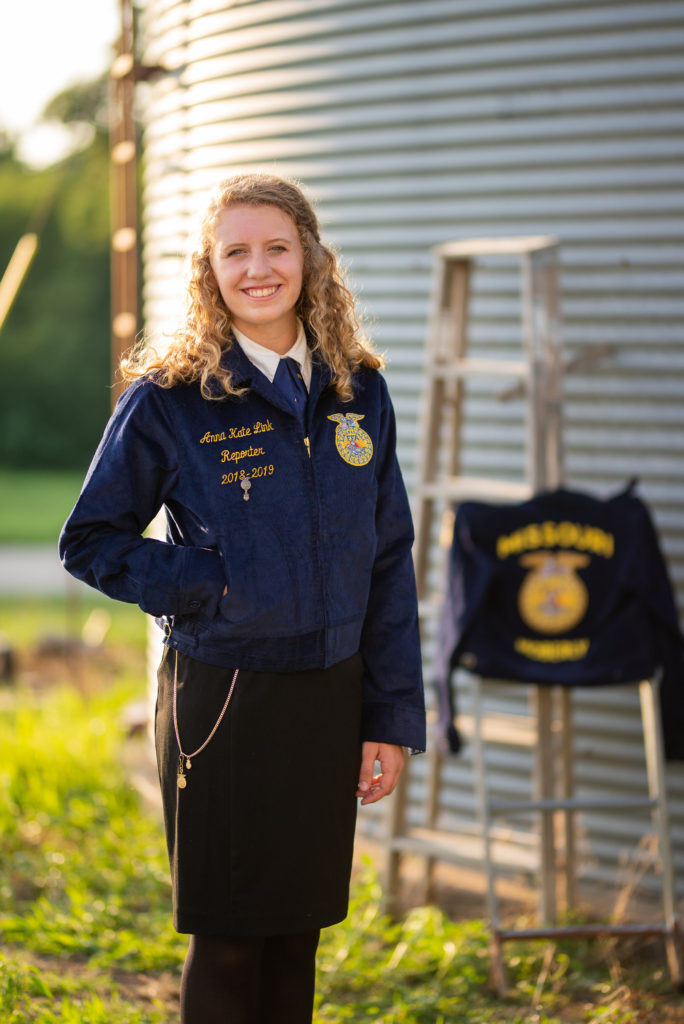
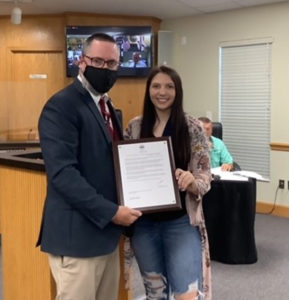
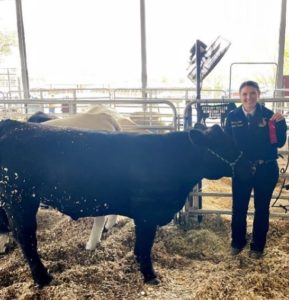
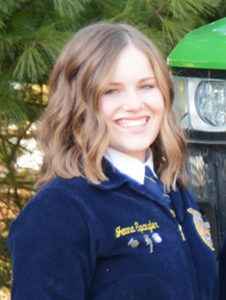

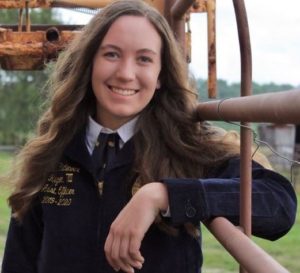
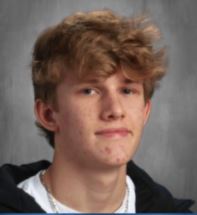
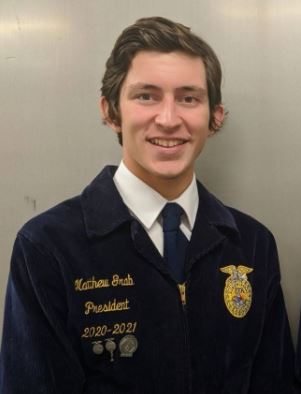
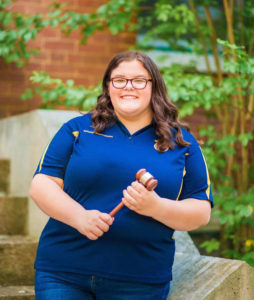
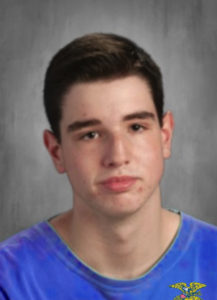
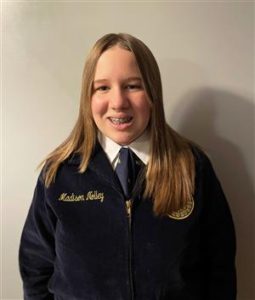
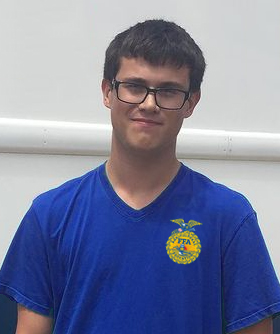
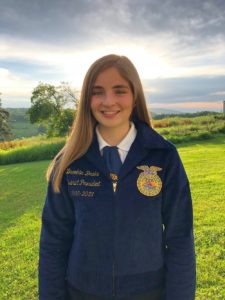
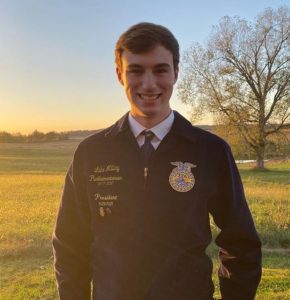
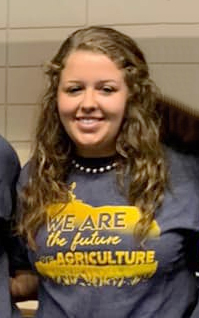
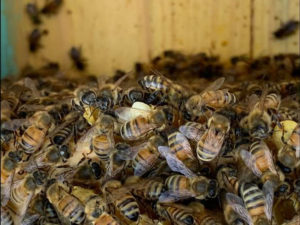
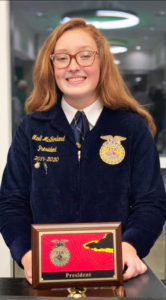
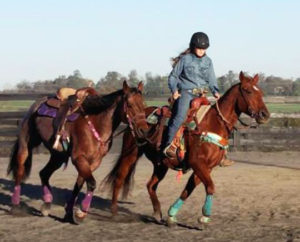
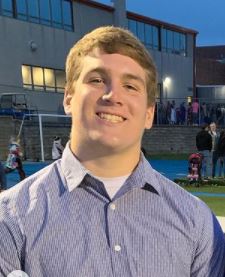
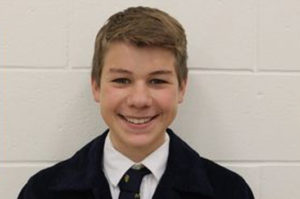
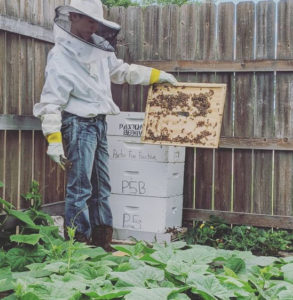
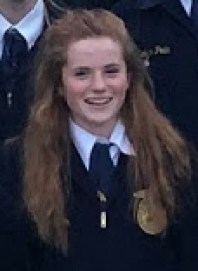
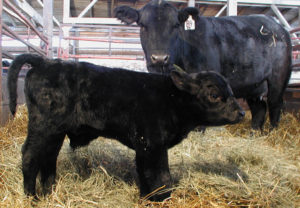
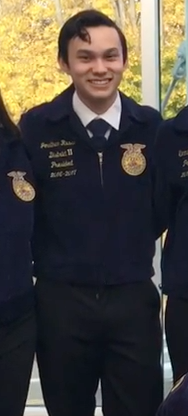
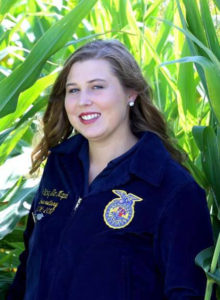
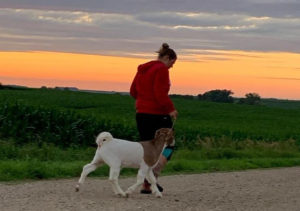 Whitney sees the industry as a key component of agriculture. Without this link in the supply chain, how would consumers receive any finished products after all? She sees her future position in the industry as vital to agriculture and to the world's food supply. She also sees this as a great way to advocate for agriculture.
Whitney sees the industry as a key component of agriculture. Without this link in the supply chain, how would consumers receive any finished products after all? She sees her future position in the industry as vital to agriculture and to the world's food supply. She also sees this as a great way to advocate for agriculture.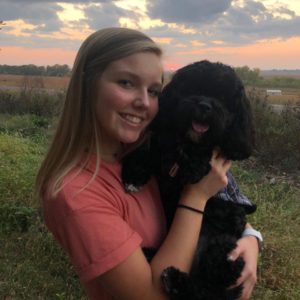
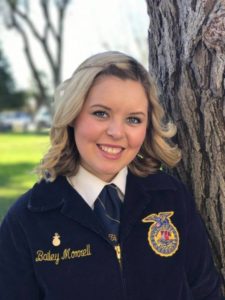
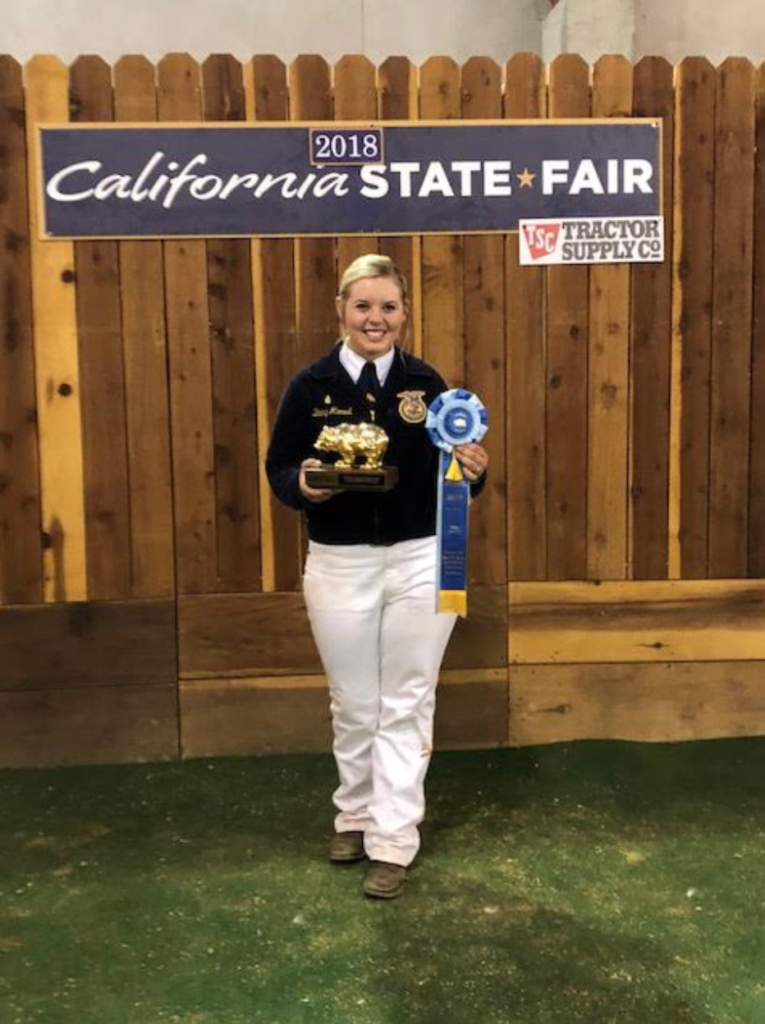 tion to be able to market her oats to a niche market
tion to be able to market her oats to a niche market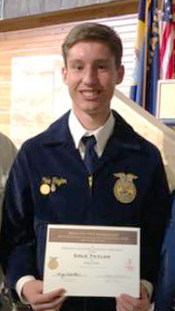
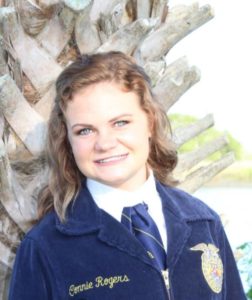
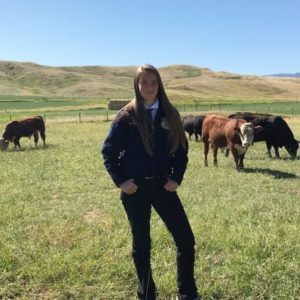
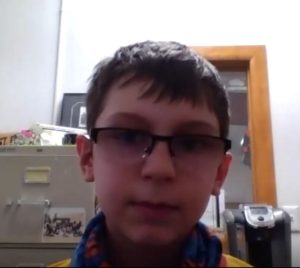
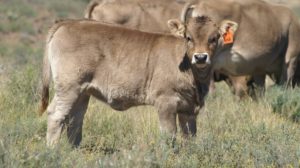 Four years from now, when I interview Wyatt again, it will be obvious how much he has grown. And, we will be able to look back on this interview and see the before and after pictures of a high achieving FFA student.
Four years from now, when I interview Wyatt again, it will be obvious how much he has grown. And, we will be able to look back on this interview and see the before and after pictures of a high achieving FFA student.
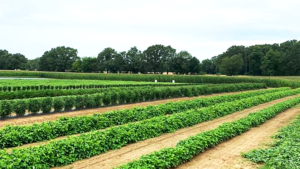 They took their business name from the legacy left by their great-grandfather, whose barn they sell out of when they are not at the local produce market in Murray on Saturday's. All the cousins have a different area of specialty in the garden. For Savannah it is tomatoes. Savannah is learning a lot about business through this experience. So much so, that she is even signing up for business classes and activities outside of the FFA.
They took their business name from the legacy left by their great-grandfather, whose barn they sell out of when they are not at the local produce market in Murray on Saturday's. All the cousins have a different area of specialty in the garden. For Savannah it is tomatoes. Savannah is learning a lot about business through this experience. So much so, that she is even signing up for business classes and activities outside of the FFA.
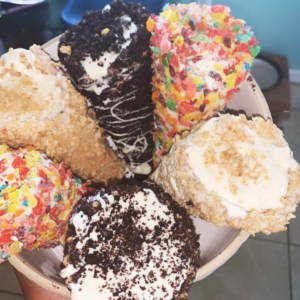 What stands out about this interview with Paige is her goals and her attitude. Starting with her attitude, she has not been in a classroom since March of 2019 when lockdowns first began. During that time she became the chaplain of her FFA chapter, but she has not really been able to do anything with the role. This is frustrating. However, Paige has not looked at this situation as a source of frustration. She has looked at it as a source of opportunity. It has been during this time that she started Pastries By Paige.
What stands out about this interview with Paige is her goals and her attitude. Starting with her attitude, she has not been in a classroom since March of 2019 when lockdowns first began. During that time she became the chaplain of her FFA chapter, but she has not really been able to do anything with the role. This is frustrating. However, Paige has not looked at this situation as a source of frustration. She has looked at it as a source of opportunity. It has been during this time that she started Pastries By Paige.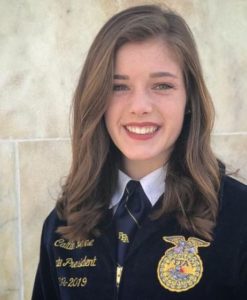
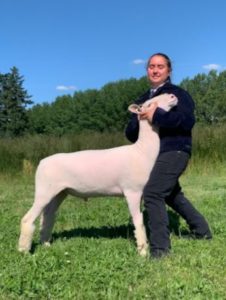
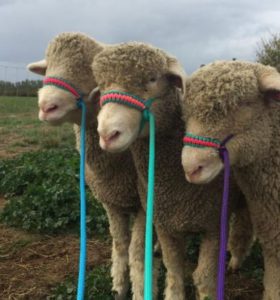 In a situation where most seventh graders would look at a product and declare, "I want that", Dresen looked at the product and said, "this won't work, and here is why. I can make it better". This characteristic of examining something and really studying it before the emotion of wanting it overtakes you is Dresen's "entrepreneurial attribute". This ability to look at something, and instead of becoming excited to determine its shortcomings and then build a better product is the way that so many entrepreneurs get started. To be honest, I wish that I had this attribute.
In a situation where most seventh graders would look at a product and declare, "I want that", Dresen looked at the product and said, "this won't work, and here is why. I can make it better". This characteristic of examining something and really studying it before the emotion of wanting it overtakes you is Dresen's "entrepreneurial attribute". This ability to look at something, and instead of becoming excited to determine its shortcomings and then build a better product is the way that so many entrepreneurs get started. To be honest, I wish that I had this attribute.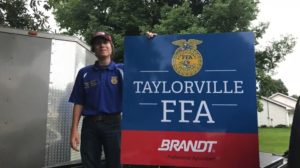
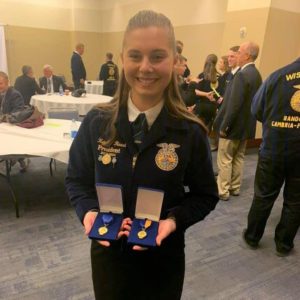
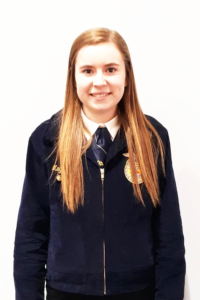
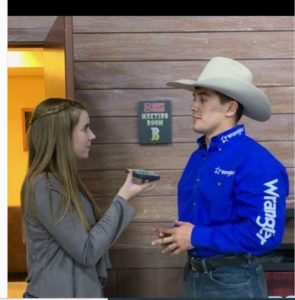 During Megan's sophomore year of high school, these two paths converged. Megan's passion and preparation met the opportunity created by the CAC Media Group. The National Western Stock Show in Denver, Colorado was coming up and the CAC was traveling there to cover the event. Somebody on the team was unable to make the trip, and they needed to find a student to fill in. Megan's FFA Coach recognized her talent and hard work based on how active Megan had been up to that point. She invited Megan to come on the trip and fill in.
During Megan's sophomore year of high school, these two paths converged. Megan's passion and preparation met the opportunity created by the CAC Media Group. The National Western Stock Show in Denver, Colorado was coming up and the CAC was traveling there to cover the event. Somebody on the team was unable to make the trip, and they needed to find a student to fill in. Megan's FFA Coach recognized her talent and hard work based on how active Megan had been up to that point. She invited Megan to come on the trip and fill in.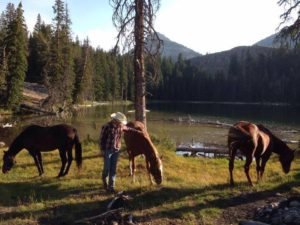
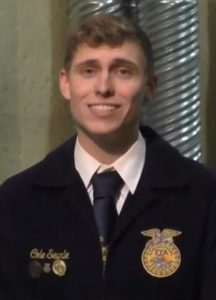 In Cole's case, I think I can solve a little bit of the mystery of what his parents did to inspire him to be so passionate about farming. The answer is, they moved to Ashton. I can visualize Cole out on the farm on a crisp, June morning, driving a tractor or irrigating. And as the sun is coming up, there is something casting a long shadow over him. That something is the peaks of the Grand Tetons.
In Cole's case, I think I can solve a little bit of the mystery of what his parents did to inspire him to be so passionate about farming. The answer is, they moved to Ashton. I can visualize Cole out on the farm on a crisp, June morning, driving a tractor or irrigating. And as the sun is coming up, there is something casting a long shadow over him. That something is the peaks of the Grand Tetons.